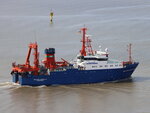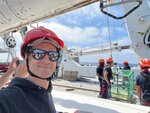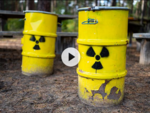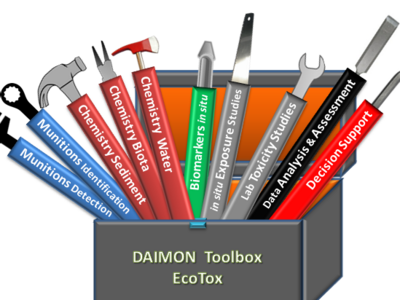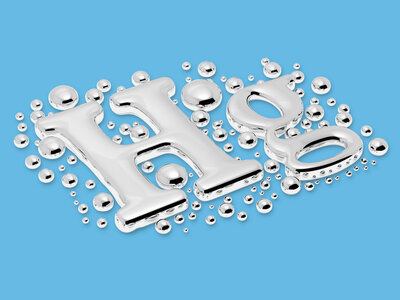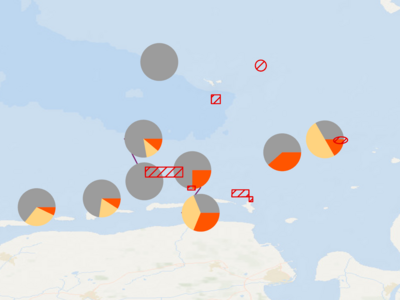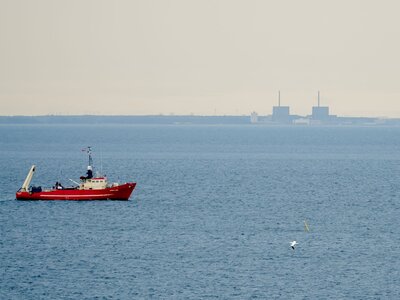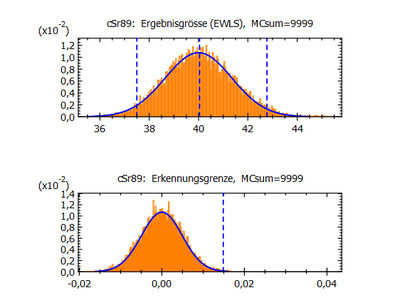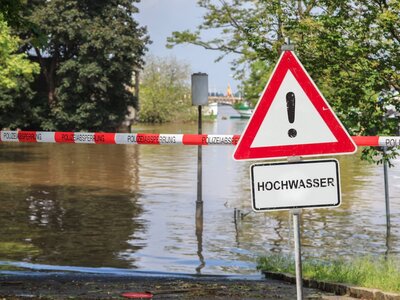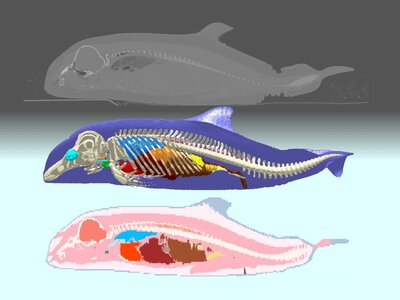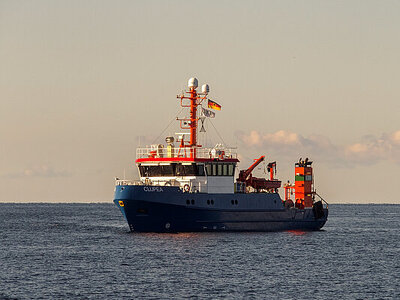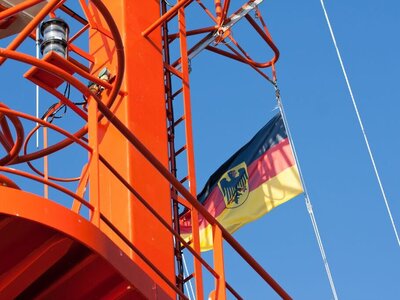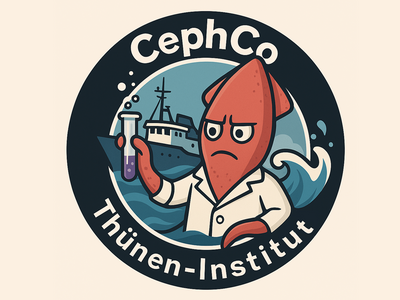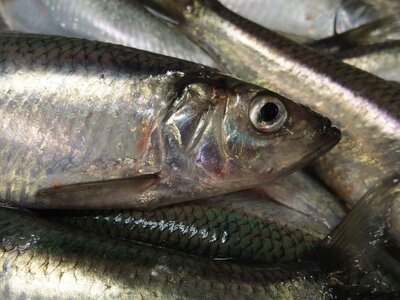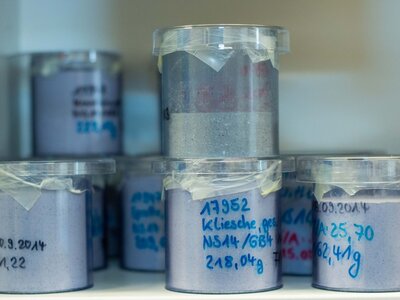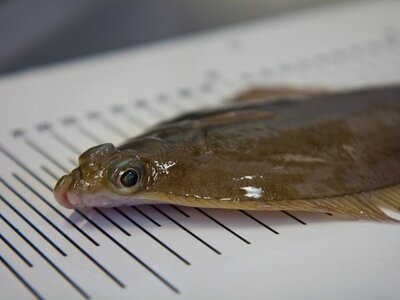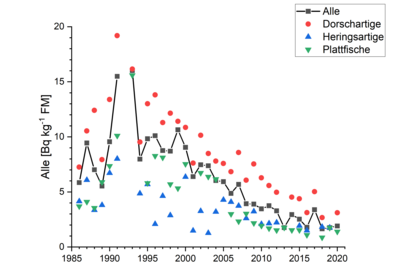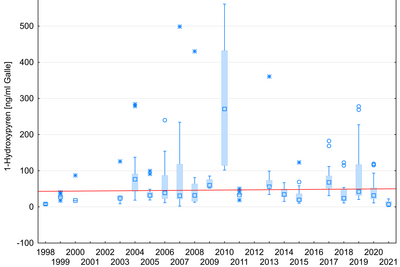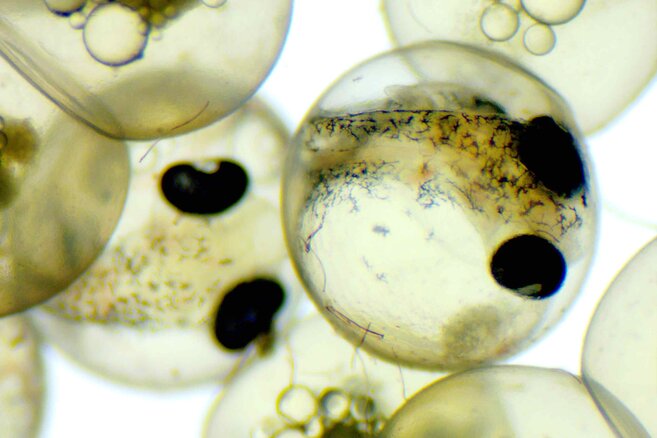

Institut für
FI Fischereiökologie
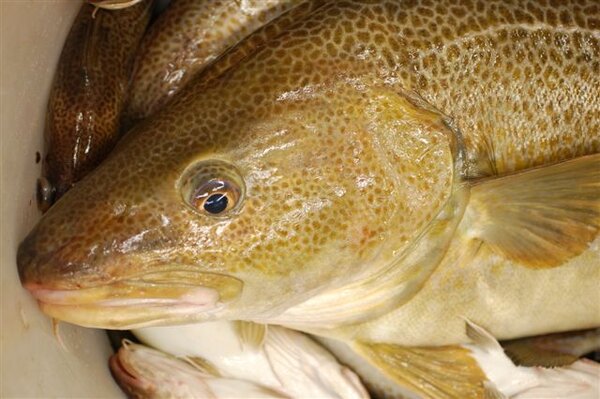
Meeresumwelt
Unsere Meeresumwelt wird in vielerlei Hinsicht durch menschliche Aktivitäten beeinflusst. Eine unserer Kernaufgaben ist es, die Auswirkungen stofflicher Umweltbelastungen auf Fische als Kompartiment der Meeresumwelt und als wichtige natürliche Ressource zu bewerten. Dazu untersuchen wir, welche potenziellen Schadstoffe bzw. Radionuklide in welchen Konzentrationen von Fischen aufgenommen werden, wie sich diese Stoffe im Fisch anreichern, wie sie auf ihn wirken und welche Abbauprodukte im Organismus entstehen, stets verbunden mit dem Blick auf ein Gefährdungspotenzial für die Verbraucher*innen. Neben verschiedenen anorganischen und organischen Schadstoffen bildet die Risikobewertung versenkter Munition einen unserer Forschungsschwerpunkte.
Aktuelles
Hintergrund
Aktuelle Projekte
Monitoring im hoheitlichen oder gesetzlichen Rahmen
Zeitreihen aus dem Umwelt-Monitoring
Publikationen aus dem Arbeitsbereich (ohne Datenpublikationen)
- 0
Aust M-O, Nogueira P (2025) 2.5.5 Fische und Produkte des Meeres und der Binnengewässer [online]. In: Bundesamt für Strahlenschutz (ed) Umweltradioaktivität und Strahlenbelastung : Jahresbericht 2021. Bonn: Bundesministerium für Umwelt, Naturschutz, nukleare Sicherheit und Verbraucherschutz, pp 90-94, zu finden in <http://nbn-resolving.de/urn:nbn:de:0221-2024112148843> [zitiert am 16.06.2025]
- 1
Aust M-O, Nogueira P (2025) 2.5.6 Fische und Wasserpflanzen in der Umgebung von Anlagen nach Atomgesetz [online]. In: Bundesamt für Strahlenschutz (ed) Umweltradioaktivität und Strahlenbelastung : Jahresbericht 2021. Bonn: Bundesministerium für Umwelt, Naturschutz, nukleare Sicherheit und Verbraucherschutz, p 94, zu finden in <http://nbn-resolving.de/urn:nbn:de:0221-2024112148843> [zitiert am 16.06.2025]
- 2
Gkotsis G, Nika M-C, Alygizakis N, Vasilatos K, Athanasopoulou A, Barber JL, Berbee R, Burgeot T, Galante Oliveira S, Gustafsson J, Iglesias Campos A, Kammann UKR, Kirchgeorg T, Koschorreck J, Mauffret A, Mil-Homens M, Larsen MM, Munch Chistensen A, Näslund J, Oswald P, et al (2025) Assessing the chemical burden of the North-East Atlantic ecosystem through targeted and untargeted HRMS-based approaches. J Hazard Mater 493:138393, DOI:10.1016/j.jhazmat.2025.138393
- 3
Aust M-O, Nogueira P, Schmied SAK (2025) Ende Gelände : warum tritiumhaltige Wässer aus Fukushima in den Pazifik eingeleitet werden und was es für den Ozean und die Menschen bedeutet [online]. In: Bundesamt für Strahlenschutz (ed) Umweltradioaktivität in der Bundesrepublik Deutschland : Bericht der Leitstellen des Bundes und des Bundesamtes für Strahlenschutz ; Stand 2024, Daten und Bewertung. Bonn: Bundesministerium für Umwelt, Naturschutz, nukleare Sicherheit und Verbraucherschutz, pp 93-96, zu finden in <http://nbn-resolving.de/urn:nbn:de:0221-2025021850448> [zitiert am 16.06.2025]
- 4
Rittinghaus H, Saborowski R, Kammann UKR, Oesterwind D, Sell AF (2025) Fatty acids and stomach contents reveal dietary overlaps of two prospering squid species in the North Sea. Ecol Evol 15(12):e72464, DOI:10.1002/ece3.72464
- 5
Achterberg EP, Rackelmann F, Ramesh A, O'Connor J, García-Oliva O, Jayachandran S, Wichert V, Li X, Purkiani K, Needham DM, Bussmann I, Fischer P, Kopf A, Lemmen C, Scharsack JP, Siebert C, Kamjunke N, Sokolova IM, Brix H (2025) Identifying and addressing the components of extreme physical-oceanographical events for improved risk management in coastal systems. Front Mar Sci 12:1681652, DOI:10.3389/fmars.2025.1681652
- 6
Örey S, Rehren J, Schulze T, Puebla O, Diekmann R (2025) Identifying fishing behavior groups from vessel movement data : application to the German brown shrimp fleet. Fish Res 283:107285, DOI:10.1016/j.fishres.2025.107285
- 7
Kammann UKR, Scharsack JP (2025) Kontamination durch versenkte Munition : TNT-Metaboliten in Fischen aus Nord- und Ostsee. Mitt Umweltchem Ökotox 31(1):8-11
- 8
Kammann UKR, Schmidt N, Lemaitre A (2025) PFAS FISCH - per- and polyfluoroalkyl substances (PFAS) in fish from German coastal areas. Bremerhaven: Thünen Institute of Fisheries Ecology, 2 p, Project Brief Thünen Inst 2025/08a, DOI:10.3220/PB1738919100000
- 9
Kammann UKR, Schmidt N, Lemaitre A (2025) PFAS FISCH - Per- und Polyfluoralkylchemikalien (PFAS) in Fischen aus deutschen Küstengebieten. Bremerhaven: Thünen-Institut für Fischereiökologie, 2 p, Project Brief Thünen Inst 2025/08, 10.3220/PB1738919029000
- 10
Aust M-O, Nogueira P (2025) Radioaktive Stoffe in Fischen [online]. In: Bundesamt für Strahlenschutz (ed) Umweltradioaktivität in der Bundesrepublik Deutschland : Bericht der Leitstellen des Bundes und des Bundesamtes für Strahlenschutz ; Stand 2024, Daten und Bewertung. Bonn: Bundesministerium für Umwelt, Naturschutz, nukleare Sicherheit und Verbraucherschutz, pp 85-92, zu finden in <http://nbn-resolving.de/urn:nbn:de:0221-2025021850448> [zitiert am 16.06.2025]
- 11
Aiya Subramani P, Gennaraki MA, Gabel M, Janssen E, Demandt N, Reiser S, Scharsack JP (2025) The immunomodulatory effects of physical enrichment in rainbow trout (Oncorhynchus mykiss). Aquacult Res 2025(1):548857, DOI:10.1155/are/5548857
- 12
Kammann UKR, Töpker V, Scharsack JP (2025) Tracking explosive contaminants from dumped munition in the western Baltic Sea via urine and bile analysis of three flatfish species. Environ Sci Europe 37:32, DOI:10.1186/s12302-025-01074-0
- 13
Axen C, Cheslett D, Madsen L, Paley R, Arzul I, Aranguren R, Bao M, Bateman K, Batista F, Bøgvwald M, Cano I, Carnegie R, Cipriani P, Constenla Matalobos M, Declercq A, Engelsma M, Eriksson-Kallio AM, Gagné N, Giulietti L, Scharsack JP, et al (2025) Working Group on Pathology and Diseases of Marine Organisms (WGPDMO). Copenhagen: ICES, 39 p, ICES Sci Rep 7(78), DOI:10.17895/ices.pub.29413142
- 14
Axen C, Cooper A, Paley R, Bao M, Bignell J, Carnegie R, Cheslett D, Cipriani P, Declercq A, Eriksson-Kallio AM, Gagné N, Garseth A-H, Giulietti L, Grade A, Haenen O, Kristmundsson Á, Levsen A, Madsen L, Mortensen S, Scharsack JP, et al (2025) Working Group on Pathology and Diseases of Marine Organisms (WGPDMO; outputs from 2024 meeting). Copenhagen: ICES, 27 p, ICES Sci Rep 7(17), DOI:10.17895/ices.pub.28343924
- 15
Pham MK, Aust M-O, Bartocci J, Blinova O, Carvalho FP, Chamizo E, Cook M, Degering D, Fujak M, Gascó C, Gurriarán R, Jobbágy V, Herrmann J, Hult M, Ilchmann C, La Rosa J, Laubenstein M, Lee S-H, Levy I, Mas JL, et al (2024) A new certified reference material IAEA-465 for radionuclides in Baltic Sea sediment. J Environ Radioact 278:107499, DOI:10.1016/j.jenvrad.2024.107499
- 16
Hanel R, Gaspare L, Mwakosya C, Kanyairitha C, Kaijage LL, Kammann UKR, Wysujack K (2024) Assessing the biodiversity of eels of Tanzania - Promoting sustainable fisheries through environmental monitoring and capacity building (BIOEELS). Bremerhaven: Thünen Institute of Fisheries Ecology, 2 p, Project Brief Thünen Inst 2024/02a, DOI:10.3220/PB1705398344000
- 17
Kanisch G, Aust M-O, Bruchertseifer F, Dalheimer A, Heckel A, Hofmann S, Kowalik C, Ober F, Rupprecht K, Schkade U-K, Wershofen H (2024) Bestimmung der charakteristischen Grenzen bei der Aktivitätsbestimmung radioaktiver Stoffe, Teil 2: Anwendungsbeispiele [online]. Bonn: Bundesministerium für Umwelt, Naturschutz, nukleare Sicherheit und Verbraucherschutz, 90 p, Messanleitungen für die "Überwachung radioaktiver Stoffe in der Umwelt und externer Strahlung" Version Juni 2024, zu finden in <https://www.bmuv.de/fileadmin/Daten_BMU/Download_PDF/Strahlenschutz/Messanleitungen_2024/CHAGR-ISO-02_V2024-06_bf.pdf> [zitiert am 26.11.2024]
- 18
Hanel R, Gaspare L, Mwakosya C, Kanyairitha C, Kaijage LL, Kammann UKR, Wysujack K (2024) Bewertung der biologischen Vielfalt von Aalen in Tansania (BIOEELS). Bremerhaven: Thünen-Institut für Fischereiökologie, 2 p, Project Brief Thünen Inst 2024/02, DOI:10.3220/PB1705398049000
- 19
Nogueira P, Kammann UKR, Schmied SAK, Aust M-O (2024) Comparison between the Baltic Sea and Irish Sea level of Cs-137 contamination on benthic, demersal and pelagic fish species. J Environ Radioact 278:107510, DOI:10.1016/j.jenvrad.2024.107510
- 20
Sepp T, Baines C, Kreitsberg R, Scharsack JP, Nogueira P, Lang T, Fort J, Sild E, Clarke JT, Tuvikene A, Meitern R (2024) Differences on the level of hepatic transcriptome between two flatfish species in response to liver cancer and environmental pollution levels. Comp Biochem Physiol C 275:109781, DOI:10.1016/j.cbpc.2023.109781
- 21
Ng TH, Harrison MC, Scharsack JP, Kurtz J (2024) Disentangling specific and unspecific components of innate immune memory in a copepod-tapeworm system. Front Immunol 15:1307477, DOI:10.3389/fimmu.2024.1307477
- 22
Kammann UKR, Töpker V, Schmidt N, Rödiger M, Aust M-O, Gabel M, Scharsack JP (2024) Explosives leaking from dumped munition contaminate fish from German coastal waters: a reason for chronic effects? Environ Sci Europe 36:116, DOI:10.1186/s12302-024-00942-5
- 23
Schäfer F, Oesterwind D, Sell AF, Kammann UKR (2024) Fatty acid analyses reveal differences in feeding ecology of North Sea squids that overlap in time and space. Food Webs 40:e00355, DOI:10.1016/j.fooweb.2024.e00355
- 24
Aust M-O, Klug B, Kanisch G (2024) Procedure for determining the specific activity of strontium-90 in fish by proportional counting. 20 p Messanleitungen für die "Überwachung radioaktiver Stoffe in der Umwelt und externer Strahlung"
- 25
Nogueira P, Aust M-O (2024) The winner takes it all : ist die Ostsee oder die Irische See am stärksten mit Cs-137 belastet? In: 16. Fachgespräch zur Überwachung der Umweltradioaktivität : einst - jetzt - in Zukunft, Kiel, 26. bis 28.09.2023 ; Tagungsband. Bonn: Bundesministerium für Umwelt, Naturschutz, nukleare Sicherheit und Verbraucherschutz, pp 278-282
- 26
Achterberg EP, Andresen C, Beck A, Brenner M, Böttcher C, Cumming A, Czub M, Frey T, Kammann UKR, Kampmeier M, Koschinski S, Koske D, Köser K, Lang T, Lastumäki A, Lehtonen KK, Lundgreen K, Lindgren F, Lyjak J, Scharsack JP, et al (2024) Thematic assessment on hazardous submerged objects in the Baltic Sea : Warfare materials in the Baltic Sea. Helsinki: HELCOM, 151 p
- 27
Kammann UKR, Aust M-O, Lewin W-C, Nogueira P, Panten K, Sell AF, Stepputtis D, Strehlow HV, Weltersbach MS, Wysujack K (2024) Umweltkontamination: Müll in deutschen Meeresgebieten. Braunschweig: Johann Heinrich von Thünen-Institut, 6 p, Thünen à la carte 13, DOI:10.3220/CA1701080947000
- 28
Aust M-O, Klug B, Kanisch G (2024) Verfahren zur Bestimmung der spezifischen Aktivität von Strontium-90 in Fisch mittels Proportionalzählrohr. 20 p Messanleitungen für die "Überwachung radioaktiver Stoffe in der Umwelt und externer Strahlung"
- 29
Ober F, Aust M-O (2024) Workshop B2 : Qualitätssicherung 1. In: 16. Fachgespräch zur Überwachung der Umweltradioaktivität : einst - jetzt - in Zukunft, Kiel, 26. bis 28.09.2023 ; Tagungsband. Bonn: Bundesministerium für Umwelt, Naturschutz, nukleare Sicherheit und Verbraucherschutz, p 215
- 30
Bringel P, Aust M-O (2024) Zusammenfassung der Sitzung : internationale Kooperation, maschinelles Lernen in der Umweltüberwachung. In: 16. Fachgespräch zur Überwachung der Umweltradioaktivität : einst - jetzt - in Zukunft, Kiel, 26. bis 28.09.2023 ; Tagungsband. Bonn: Bundesministerium für Umwelt, Naturschutz, nukleare Sicherheit und Verbraucherschutz, p 46
- 31
Aust M-O, Nogueira P (2023) 2.5.5 Fische und Produkte des Meeres und der Binnengewässer [online]. In: Bundesamt für Strahlenschutz (ed) Umweltradioaktivität und Strahlenbelastung : Jahresbericht 2020. Bonn: Bundesministerium für Umwelt, Naturschutz, nukleare Sicherheit und Verbraucherschutz, pp 65-69, zu finden in <http://nbn-resolving.de/urn:nbn:de:0221-2023092039261> [zitiert am 06.10.2023]
- 32
Aust M-O, Nogueira P (2023) 2.5.6 Fische und Wasserpflanzen in der Umgebung von Anlagen nach Atomgesetz [online]. In: Bundesamt für Strahlenschutz (ed) Umweltradioaktivität und Strahlenbelastung : Jahresbericht 2020. Bonn: Bundesministerium für Umwelt, Naturschutz, nukleare Sicherheit und Verbraucherschutz, p 69, zu finden in <http://nbn-resolving.de/urn:nbn:de:0221-2023092039261> [zitiert am 06.10.2023]
- 33
Hesse T, Nachev M, Khaliq S, Jochmann MA, Franke F, Scharsack JP, Kurtz J, Sures B, Schmidt TC (2023) A new technique to study nutrient flow in host-parasite systems by carbon stable isotope analysis of amino acids and glucose. Sci Rep 13:1054, DOI:10.1038/s41598-022-24933-9
- 34
Kammann UKR, Nogueira P, Wilhelm E, Int-Veen I, Aust M-O, Wysujack K (2023) Abandoned, lost or otherwise discarded fishing gear (ALDFG) as part of marine litter at the seafloor of the Baltic Sea - Characterization, quantification, polymer composition and possible impact. Mar Pollut Bull 194(Part A):115348, DOI:10.1016/j.marpolbul.2023.115348
- 35
Kasmi Y, Blancke T, Eschbach E, Möckel B, Casas L, Bernreuther M, Nogueira P, Delfs G, Kadhim S, Meißner T, Rödiger M, Eladdadi A, Stransky C, Hanel R (2023) Atlantic cod (Gadus morhua) assessment approaches in the North and Baltic Sea: A comparison of environmental DNA analysis versus bottom trawl sampling. Front Mar Sci 10:1058354, DOI:10.3389/fmars.2023.1058354
- 36
Schäfer F, Kammann UKR (2023) CLEAN FISH - alternative food from cell culture. Bremerhaven: Thünen Institute of Fisheries Ecology, 2 p, Project Brief Thünen Inst 2023/36a, DOI:10.3220/PB1690784467000
- 37
Schäfer F, Kammann UKR (2023) CLEAN FISH - Alternative Lebensmittel aus der Zellkultur. Bremerhaven: Thünen-Institut für Fischereiökologie, 2 p, Project Brief Thünen Inst 2023/36, DOI:10.3220/PB1690783541000
- 38
Kammann UKR, Pohlmann J-D, Wariaghli F, Bourassi H, Regelsberger K, Yahyaoui A, Hanel R (2023) COFISHMAP - Assessment of Moroccan coastal fish habitat and water quality. Bremerhaven: Thünen Institute of Fisheries Ecology, 2 p, Project Brief Thünen Inst 2023/08a, DOI:10.3220/PB1672824208000
- 39
Kammann UKR, Pohlmann J-D, Wariaghli F, Bourassi H, Regelsberger K, Yahyaoui A, Hanel R (2023) COFISHMAP - Bewertung der Qualität von küstennahen Fisch-Habitaten in Marokko. Bremerhaven: Thünen-Institut für Fischereiökologie, 2 p, Project Brief Thünen Inst 2023/08, DOI:10.3220/PB1672823831000
- 40
Baines C, Meitern R, Kreitsberg R, Fort J, Scharsack JP, Nogueira P, Giraudeau M, Sepp T (2023) Correlations between oxidative DNA damage and formation of hepatic tumours in two flatfish species from contaminated environments. Biol Lett 19(5):20220583, DOI:10.1098/rsbl.2022.0583
- 41
Galgani F, Ruiz Orejon Sanchez Pastor L, Ronchi F, Tallec K, Fischer EK, Matiddi M, Anastasopoulou A, Andresmaa E, Angiolillo M, Bakker Paiva M, Booth AM, Buhhalko N, Cadiou B, Claro F, Consoli P, Darmon G, Deudero S, Fleet D, Fortibuoni T, Kammann UKR, et al (2023) Guidance on the monitoring of marine litter in European seas : An update to improve the harmonised monitoring of marine litter under the Marine Strategy Framework Directive. Luxembourg: Publications Office of the European Union, iii, 193 p, JRC Techn Rep 133594, DOI:10.2760/59137
- 42
Matiddi M, Silvestri C, Anastasopoulou A, Andresmaa E, Angiolillo M, Bakker Paiva M, Buhhalko N, Cadiou B, Claro F, Consoli P, Darmon G, Deudero S, Fischer EK, Fossi MC, Galgani F, Gerigny O, Guse N, Hanke G, Ioakeimidis C, Kammann UKR, et al (2023) Litter and microlitter ingested by biota and entanglement with litter. JRC Techn Rep 133594:91-133, DOI:10.2760/59137
- 43
Zalewska T, Aust M-O (2023) Radioactive substances: Caesium-137 in fish and surface seawater [online]. Helsinki: HELCOM, 37 p, HELCOM core indicator report, zu finden in <https://indicators.helcom.fi/indicator/radioactive-substances/> [zitiert am 06.11.2023]
- 44
Sepp T, Baines C, Kreitsberg R, Scharsack JP, Nogueira P, Lang T, Fort J, Sild E, Clarke JT, Tuvikene A, Meitern R (2023) Response to oncogenic pollution in two fish species: are there differences in adaptive potential? [Preprint] [online]. Rochester: SSRN, 49 p, zu finden in <https://ssrn.com/abstract=4333552> [zitiert am 27.02.2023], DOI:10.2139/ssrn.4333552
- 45
Núñez-Riboni I, Costas G, Diekmann R, Ulleweit J, Kloppmann MHF (2023) Reviewing and improving spatiotemporal modeling approaches for mackerel's total annual egg production. Rev Fish Biol Fisheries 33(4):1523-1546, DOI:10.1007/s11160-023-09795-2
- 46
Galgani F, Fortibuoni T, Hanke G, Angiolillo M, Giorgetti A, Norén K, Vinci M, Ronchi F, Andresmaa E, Ruiz M, Pragnell-Raasch H, Anastasopoulou A, Loon WMGM van, Schultze M, Kammann UKR, Rindorf A, Storr-Paulsen M, Gerigny O (2023) Seafloor macro litter. JRC Techn Rep 133594:57-65, DOI:10.2760/59137
- 47
Kammann UKR, Nogueira P, Siegmund M, Schmidt N, Schmolke S, Kirchgeorg T, Hasenbein M, Wysujack K (2023) Temporal trends of mercury levels in fish (dab, Limanda limanda) and sediment from the German Bight (North Sea) in the period 1995-2020. Environ Monit Assessm 195(1):73, DOI:10.1007/s10661-022-10655-y
- 48
Kammann UKR, Aust M-O, Nogueira P, Wysujack K (2023) Umweltkontamination: Quecksilber in Fischen. Braunschweig: Johann Heinrich von Thünen-Institut, 6 p, Thünen à la carte 11, DOI:10.3220/CA1671025394000
- 49
Nogueira P, Kammann UKR, Aust M-O (2023) Visual quantification and identification of shallow seafloor marine litter in the southernmost North and Baltic seas using an epibenthic video sledge (EVS) - A comparison to bottom trawl data. Sci Total Environ 891:164633, DOI:10.1016/j.scitotenv.2023.164633
- 50
Aust M-O, Nogueira P (2022) 2.5.5 Fische und Produkte des Meeres und der Binnengewässer. In: Umweltradioaktivität und Strahlenbelastung : Jahresbericht 2019. Bonn: Bundesministerium für Umwelt, Naturschutz und nukleare Sicherheit (BMU), pp 66-70
- 51
Aust M-O, Nogueira P (2022) 2.5.6 Fische und Wasserpflanzen in der Umgebung von Anlagen nach Atomgesetz. In: Umweltradioaktivität und Strahlenbelastung : Jahresbericht 2019. Bonn: Bundesministerium für Umwelt, Naturschutz und nukleare Sicherheit (BMU), p 70
- 52
Kanisch G, Aust M-O, Bruchertseifer F, Dalheimer A, Heckel A, Hofmann S, Kowalik C, Ober F, Rupprecht K, Schkade U-K, Wershofen H (2022) Bestimmung der charakteristischen Grenzen bei der Aktivitätsbestimmung radioaktiver Stoffe Teil 1: Grundlagen : CHAGR-ISO-01. 84 p
- 53
Kanisch G, Aust M-O, Bruchertseifer F, Dalheimer A, Heckel A, Hofmann S, Kowalik C, Ober F, Rupprecht K, Schkade U-K, Wershofen H (2022) Bestimmung der massebezogenen Aktivität von Radionukliden : Äquival/Massakt. 7 p
- 54
Barry J, Russell J, Hal R van, Loon WMGM van, Noren K, Kammann UKR, Galgani F, Gago J, Dewitte B, Gerigny O, Lopes C, Pham CK, Garcia S, Sousa R, Rindorf A (2022) Composition and spatial distribution of litter on the seafloor : common indicator assessment : OSPAR's quality status report 2023 [online]. London: OSPAR Commission, 36 p, zu finden in <https://oap-cloudfront.ospar.org/media/filer_public/b9/a4/b9a48a00-29ff-42a5-8e8f-20a14d2972f0/p00882_seabed_litter_indicator_assessment_qsr2023.pdf> [zitiert am 23.01.2023]
- 55
Kammann UKR, Pohlmann J-D, Wariaghli F, Bourassi H, Regelsberger K, Yahyaoui A, Hanel R (2022) Heavy metal contamination in European conger (Conger conger, Linnaeus 1758) along the coastline of Morocco. Environ Sci Europe 34:114, DOI:10.1186/s12302-022-00694-0
- 56
O'Donoghue A, Booth A, De Witte B, Silburn B, Pham C, Galgani F, Int-Veen I, Gago J, Barry J, Noren K, Clayton L, Buhl-Mortensen L, Bredahl Nerdal L, Devriese L, Hall M, Russell M, Hal R van, Maes T, Wodzinowski T, Kammann UKR (2022) ICES manual for seafloor litter data collection and reporting from demersal trawl samples. Copenhagen: ICES, ii, 16 p, ICES Techn Mar Environ Sci 67, DOI:10.17895/ices.pub.21435771
- 57
Hesse T, Nachev M, Khaliq S, Jochmann MA, Franke F, Scharsack JP, Kurtz J, Sures B, Schmidt TC (2022) Insights into amino acid fractionation and incorporation by compound-specific carbon isotope analysis of three-spined sticklebacks. Sci Rep 12:11690, DOI:10.1038/s41598-022-15704-7
- 58
Sguotti C, Blöcker AM, Färber L, Blanz B, Cormier R, Diekmann R, Letschert J, Rambo H, Stollberg N, Stelzenmüller V, Stier AC, Möllmann C (2022) Irreversibility of regime shifts in the North Sea. Front Mar Sci 9:945204, DOI:10.3389/fmars.2022.945204
- 59
Bunge A, Lugert V, McClure M, Kammann UKR, Hanel R, Scharsack JP (2022) Less impact than suspected: Dietary exposure of three-spined sticklebacks to microplastic fibers does not affect their body condition and immune parameters. Sci Total Environ 819:153077, DOI:10.1016/j.scitotenv.2022.153077
- 60
Wilczynski W, Radlinska M, Wysujack K, Czub M, Brzezinski T, Kowalczyk G, Beldowski J, Nogueira P, Maszczyk P (2022) Metagenomic analysis of the gastrointestinal microbiota of Gadus morhua callarias L. originating from a chemical munition dump site. Toxics 10(5):206, DOI:10.3390/toxics10050206
- 61
Bunge A, Int-Veen I, Lang T, Hanel R, Scharsack JP, Kammann UKR (2022) PlasM - Microplastic in fish. Bremerhaven: Thünen Institute of Fisheries Ecology, 2 p, Project Brief Thünen Inst 2022/04a, DOI:10.3220/PB1643102022000
- 62
Bunge A, Int-Veen I, Lang T, Hanel R, Scharsack JP, Kammann UKR (2022) PlasM - Mikroplastik im Fisch. Bremerhaven: Thünen-Institut für Fischereiökologie, 2 p, Project Brief Thünen Inst 2022/04, DOI:10.3220/PB1643101116000
- 63
Scharsack JP, Franke F (2022) Temperature effects on teleost immunity in the light of climate change. J Fish Biol 101(4):780-796, DOI:10.1111/jfb.15163
- 64
Aust M-O, Kanisch G, Rieth U (2022) Verfahren zur alphaspektrometrischen Bestimmung der spezifischen Aktivitäten von Americium-241 und Curiumisotopen in Fisch : G-α-SPEKT-FISCH-02. 26 p
- 65
Campbell N, Coleman P, Dorrien C von, Diekmann R, Edwards D, Egekvist J, Gibin M, Gonzales Mirelis G, Hintzen N, Hjörleifsson E, Holah H, Jakovleva I, Jonsson P, Katara I, Kovsars M, Kraan C, Lamoni L, Martinez R, Örey S, Schulze T, et al (2022) Working group on spatial fisheries data (WGSFD; outputs from 2021 meeting). Copenhagen: ICES, iii, 151 p, ICES Sci Rep 4(92), DOI:10.17895/ices.pub.21630236
- 66
Aust M-O, Nogueira P (2021) 2.5.5 Fische und Produkte des Meeres und der Binnengewässer. In: Umweltradioaktivität und Strahlenbelastung : Jahresbericht 2018. Bonn: Bundesministerium für Umwelt, Naturschutz und Reaktorsicherheit (BMU), pp 71-75
- 67
Aust M-O, Nogueira P (2021) 2.5.6 Fische und Wasserpflanzen in der Umgebung von Anlagen nach Atomgesetz. In: Umweltradioaktivität und Strahlenbelastung : Jahresbericht 2018. Bonn: Bundesministerium für Umwelt, Naturschutz und Reaktorsicherheit (BMU), p 75
- 68
Weichert FG, Axén C, Förlin L, Inostroza PA, Kammann UKR, Welling A, Sturve J, Asker N (2021) A multi-biomarker study on Atlantic salmon (Salmosalar L.) affected by the emerging Red Skin Disease in the Baltic Sea. J Fish Dis 44(4):429-440, DOI:10.1111/jfd.13288
- 69
Gilbin R, Arnold T, Beresford NA, Berthomieu C, Brown JE, de With G, Horemans N, Madruga MJ, Masson O, Merroun M, Michalik B, Muikku M, O’Toole S, Mrdakovic Popic J, Nogueira P, Real A, Sachs S, Salbu B, Stark K, Steiner M, et al (2021) An updated strategic research agenda for the integration of radioecology in the european radiation protection research. J Environ Radioact 237:106697, DOI:10.1016/j.jenvrad.2021.106697
- 70
Scharsack JP, Wieczorek B, Schmidt-Drewello A, Büscher J, Franke F, Moore A, Branca A, Witten A, Stoll M, Bornberg-Bauer E, Wicke S, Kurtz J (2021) Climate change facilitates a parasite’s host exploitation via temperature-mediated immunometabolic processes. Global Change Biol 27(1):94-107, DOI:10.1111/gcb.15402
- 71
Kammann UKR (2021) DAIMON Ecotox Toolbox in a nutshell : short practical guidance to explain and apply the Ecotox Toolbox (in simple version) [online]. Bremerhaven: Thünen Institute of Fisheries Ecology, 2 p, zu finden in <https://www.thuenen.de/media/institute/fi/Meeresumwelt/DAIMON_Ecotox_Toolbox/DAIMON_Ecotox_Toolbox_in_a_nutshell.pdf> [zitiert am 12.07.2022], DOI:10.13140/RG.2.2.28450.50886
- 72
Lang T, Kammann UKR (eds) (2021) DAIMON ECOTOX Toolbox- Toolbox for the assessment of marine munitions’ impact on biota [online]. Bremerhaven: Thünen Institute of Fisheries Ecology, 16 p, zu finden in <https://www.thuenen.de/media/institute/fi/Meeresumwelt/DAIMON_Ecotox_Toolbox/DAIMON_A_2.5_Toolbox__for_JS_vs_1_0.pdf> [zitiert am 12.07.2022], DOI:10.13140/RG.2.2.13351.01444
- 73
Kammann UKR, Straumer K, Koske D, Scharsack JP (2021) DAIMON2: Decision aid for marine munitions - practical application. Bremerhaven: Thünen Institute of Fisheries Ecology, 1 p, Project Brief Thünen Inst 2021/18a, DOI:10.3220/PB1623067464000
- 74
Kammann UKR, Straumer K, Koske D, Scharsack JP (2021) DAIMON2: Entscheidungshilfe für Munition im Meer - Praktische Anwendung. Bremerhaven: Thünen-Institut für Fischereiökologie, 1 p, Project Brief Thünen Inst 2021/18, DOI:10.3220/PB1623067095000
- 75
Kammann UKR, Aust M-O, Siegmund M, Schmidt N, Straumer K, Lang T (2021) Deep impact? Is mercury in dab (Limanda limanda) a marker for dumped munition? Results from munition dump site Kolberger Heide (Baltic Sea). Environ Monit Assessm 193:788, DOI:10.1007/s10661-021-09564-3
- 76
Scharsack JP, Koske D, Straumer K, Kammann UKR (2021) Effects of climate change on marine dumped munitions and possible consequence for inhabiting biota. Environ Sci Europe 33:102, DOI:10.1186/s12302-021-00537-4
- 77
Bunge A, Kammann UKR, Scharsack JP (2021) Exposure to microplastic fibers does not change fish early life stage development of three-spined sticklebacks (Gasterosteus aculeatus). Micropl Nanopl 1:15, DOI:10.1186/s43591-021-00015-x
- 78
Tornero V, Hanke G, Haber A, Künitzer A, Mauffret A, Munch Christensen A, Oros A, McHugh B, Maggi C, Bijstra D, ten Hulscher D, McGovern E, Vähä E, Giorgi G, Hatzianestis I, Aigars J, Bellas J, Campillo JA, Lusic J, Kammann UKR, et al (2021) Guidance on potential exclusion of certain WFD priority substances from MSFD monitoring beyond coastal and territorial waters. Luxembourg: Publications Office of the European Union, 35 p, JRC Techn Rep, DOI:10.2760/839892
- 79
Kammann UKR, Koske D, Schmidt N (2021) Investigations on the importance of contamination from dumped munitions in the Baltic Sea for bottom-dwelling fish species. Bremerhaven: Thünen Institute of Fisheries Ecology, 1 p, Project Brief Thünen Inst 2021/06a, DOI:10.3220/PB1613387762000
- 80
Rebelein A, Int-Veen I, Kammann UKR, Scharsack JP (2021) Microplastic fibers - Underestimated threat to aquatic organisms? Sci Total Environ 777:146045, DOI:10.1016/j.scitotenv.2021.146045
- 81
Demandt N, Bierbach D, Kurvers RHJM, Krause J, Kurtz J, Scharsack JP (2021) Parasite infection impairs the shoaling behaviour of uninfected shoal members under predator attack. Behav Ecol Sociobiol 75:148, DOI:10.1007/s00265-021-03080-7
- 82
Int-Veen I, Nogueira P, Isigkeit J, Hanel R, Kammann UKR (2021) Positively buoyant but sinking: Polymer identification and composition of marine litter at the seafloor of the North Sea and Baltic Sea. Mar Pollut Bull 172:112876, DOI:10.1016/j.marpolbul.2021.112876
- 83
Aust M-O, Nogueira P (2021) Radioaktive Stoffe in Fischen [online]. In: Umweltradioaktivität in der Bundesrepublik Deutschland : Bericht der Leitstellen des Bundes und des Bundesamtes für Strahlenschutz ; Stand 2021 ; Daten und Bewertung. Bonn: Bundesministerium für Umwelt, Naturschutz und nukleare Sicherheit (BMU), pp 71-76, zu finden in <http://nbn-resolving.de/urn:nbn:de:0221-2022010530428> [zitiert am 14.02.2022]
- 84
Canals M, Pham CK, Bergmann M, Gutow L, Hanke G, Sebille E van, Angiolillo M, Buhl-Mortensen L, Cau A, Ioakeimidis C, Kammann UKR, Lundsten L, Papatheodorou G, Purser A, Sanchez-Vidal A, Schulz M, Vinci M, Chiba S, Galgani F, Langenkämper D, et al (2021) The quest for seafloor macrolitter: a critical review of background knowledge, current methods and future prospects. Environ Res Lett 16(2):023001, DOI:10.1088/1748-9326/abc6d4
- 85
Nogueira P, Aust M-O (2021) Trübe Aussichten für Fische? Modellierung der Strahlungseffekte auf Fischaugen mittels Monte-Carlo-Simulation [online]. In: Umweltradioaktivität in der Bundesrepublik Deutschland : Bericht der Leitstellen des Bundes und des Bundesamtes für Strahlenschutz ; Stand 2021 ; Daten und Bewertung. Bonn: Bundesministerium für Umwelt, Naturschutz und nukleare Sicherheit (BMU), pp 77-80, zu finden in <http://nbn-resolving.de/urn:nbn:de:0221-2022010530428> [zitiert am 14.02.2022]
- 86
Kammann UKR, Koske D, Schmidt N (2021) Untersuchungen zur Bedeutung der Schadstoffbelastung aus versenkter Munition in der Ostsee für Bodenfischarten. Bremerhaven: Thünen-Institut für Fischereiökologie, 1 p, Project Brief Thünen Inst 2021/06, DOI:10.3220/PB1613387007000
- 87
Hoey G van, Eigaard OR, Kooten T van, Denderen D van, Bastardie F, Beauchard O, Bennecke S, Bernard G, Bolam S, Boulcott P, Burgos JM, Canals Artigas M, Coleman P, Colombelli A, Connor D, D'Andrea L, Depestele J, Diekmann R, Dinesen GE, Egekvist J, et al (2021) Working Group on Fisheries Benthic Impact and Trade-offs (WGFBIT; outputs from 2020 meeting). Copenhagen: ICES, 46 p, ICES Sci Rep 3(70), DOI:10.17895/ices.pub.8223
- 88
Maes T, Booth A, Galgani F, Bakir A, Barry J, Buhl-Mortensen L, Clayton L, Devriese L, De Witte B, Gago J, Hall M, Int-Veen I, Kammann UKR, Noren K, Näkki P, Rindorf A, Russell M, Silburn B, Storr-Paulsen M, Wodzinowski T (2021) Working Group on Marine Litter (WGML; outputs from 2020 meeting). Copenhagen: ICES, 90 p, ICES Sci Rep 3(51), DOI:10.17895/ices.pub.8185
- 89
Scharsack JP, Zoll E (2020) "Bittere Prognose" [Interview]. Südwest-Presse Magazin am Wochenende(18. Juli 2020):31
- 90
Peuß R, Box AC, Chen S, Wang Y, Tsuchiya D, Persons JL, Kenzior A, Maldonado E, Krishnan J, Scharsack JP, Slaughter BD, Rohner N (2020) Adaptation to low parasite abundance affects immune investment and immunopathological responses of cavefish. Nature Ecol Evol 4:1416-1430, DOI:10.1038/s41559-020-1234-2
- 91
Bisenius S, Neuhaus H, Effkemann S, Heemken O, Bartelt E, Lang T, Haunhorst E, Kehrenberg C (2020) Composition of herring and cod fillets from the North and the Baltic Sea - detecting added water. Food Contr 107:106766, DOI:10.1016/j.foodcont.2019.106766
- 92
Niemikoski H, Straumer K, Ahvo A, Turja R, Brenner M, Rautanen T, Lang T, Lehtonen KK, Vanninen P (2020) Detection of chemical warfare agent related phenylarsenic compounds and multibiomarker responses in cod (Gadus morhua) from munition dumpsites. Mar Environ Res 162:105160, DOI:10.1016/j.marenvres.2020.105160
- 93
Koske D, Goldenstein N, Rosenberger T, Machulik U, Hanel R, Kammann UKR (2020) Dumped munitions: New insights into the metabolization of 2,4,6-trinitrotoluene in Baltic flatfish. Mar Environ Res 160:104992, DOI:10.1016/j.marenvres.2020.104992
- 94
Köster F-W, Huwer B, Kraus G, Diekmann R, Eero M, Makarchouk A, Örey S, Dierking J, Margonski P, Herrmann JP, Tomkiewicz J, Oesterwind D, Kotterba P, Haslob H, Voss R, Reusch TBH (2020) Egg production methods applied to Eastern Baltic cod provide indices of spawning stock dynamics. Fish Res 227:105553, DOI:10.1016/j.fishres.2020.105553
- 95
Koske D, Straumer K, Goldenstein N, Hanel R, Lang T, Kammann UKR (2020) First evidence of explosives and their degradation products in dab (Limanda limanda L.) from a munition dumpsite in the Baltic Sea. Mar Pollut Bull 155:111131, DOI:10.1016/j.marpolbul.2020.111131
- 96
Becke C, Beeck P, Behrmann-Godel J, Brinker A, Fey D, Focken U, Füllner G, Hanel R, Harder H, Lasner T, Lemcke R, Momme M, Posselt U, Reiser S, Reiter R, Stapel J, Scharsack JP, Schiller T, Schmekel K, Schmidt G, et al (2020) Nationaler Strategieplan Aquakultur NASTAQ 2021 - 2030 für Deutschland. Bonn: Bundesministerium für Ernährung und Landwirtschaft (BMEL), 157 p
- 97
Demandt N, Praetz M, Kurvers RHJM, Krause J, Kurtz J, Scharsack JP (2020) Parasite infection disrupts escape behaviours in fish shoals. Proc R Soc Ser B Biol Sci 287(1938):20201158, DOI:10.1098/rspb.2020.1158
- 98
Nogueira P, Rühm W (2020) Person-specific calibration of a partial body counter used for individualised Am241 skull measurements. J Radiol Protect 40(4):1362, DOI:10.1088/1361-6498/abbe36
- 99
Möller KO, John MS, Temming A, Diekmann R, Peters J, Floeter J, Sell AF, Herrmann JP, Gloe D, Schmidt JO, Hinrichsen HH, Möllmann C (2020) Predation risk triggers copepod small-scale behavior in the Baltic Sea. J Plankton Res 42(6):702-713, DOI:10.1093/plankt/fbaa044
- 100
Lauerburg RAM, Diekmann R, Blanz B, Gee K, Held H, Kannen A, Möllmann C, Probst WN, Rambo H, Cormier R, Stelzenmüller V (2020) Socio-ecological vulnerability to tipping points: A review of empirical approaches and their use for marine management. Sci Total Environ 705:135838, DOI:10.1016/j.scitotenv.2019.135838
- 101
Niemikoski H, Koske D, Kammann UKR, Lang T, Vanninen P (2020) Studying the metabolism of toxic chemical warfare agent-related phenylarsenic chemicals in vitro in cod liver. J Hazard Mater 391:122221, DOI:10.1016/j.jhazmat.2020.122221
- 102
Straumer K, Kraugerud M, Feist SW, Ahvo A, Lehtonen K, Lastumäki A, Ljønes M, Aa Tørnes J, Lang T (2020) The use of Atlantic hagfish (Myxine glutinosa) as a bioindicator species for studies on effects of dumped chemical warfare agents in the Skagerrak. 1: Liver histopathology. Mar Environ Res 161:105046, DOI:10.1016/j.marenvres.2020.105046
- 103
Ahvo A, Lehtonen KK, Lastumäki A, Straumer K, Kraugerud M, Feist SW, Lang T, Aa Tørnes J (2020) The use of atlantic hagfish (Myxine glutinosa) as a bioindicator species for studies on effects of dumped chemical warfare agents in the skagerrak. 2. Biochemical biomarkers. Mar Environ Res 162:105097, DOI:10.1016/j.marenvres.2020.105097
- 104
Kenny A, Olsen E, Belgrano A, Devine J, Diekmann R, Falkenhaug T, Fraga A, Hallin JK, Hansen C, Judd A, Kempf J, Kvamme C, Lynam CP, Martinez I, Nash RDM, Payne MR, Piet GJ, Skern-Mauritzen M, Skjaeraasen JE, Stelzenmüller V, et al (2020) Working Group on Integrated Assessment of the North Sea (WGINOSE). Copenhagen: ICES, 78 p, ICES Sci Rep 2(68), DOI:10.17895/ices.pub.7430
- 105
Carnegie R, Axén C, Cheslett D, Eriksson-Kallio AM, Grade A, Haenen O, Kristmundsson Á, Kvamme BO, Levsen A, Lillehaug A, Madsen L, Medne R, Munro E, Paley R, Pires D, Podolska M, Ramos P, Renault T,, Ruane N, Ruano F, Soares F, Scharsack JP (2020) Working Group on Pathology and Diseases of Marine Organisms (WGPDMO). Copenhagen: ICES, 23 p, ICES Sci Rep 2(53), DOI:10.17895/ices.pub.6086
- 106
Werner K-M, Taylor MH, Diekmann R, Lloret J, Möllmann C, Primicerio R, Fock HO (2019) Evidence for limited adaptive responsiveness to large-scale spatial variation of habitat quality. Mar Ecol Progr Ser 629:179-191, DOI:10.3354/meps13120
- 107
López M, Nogueira P, Vrba T, Tanner R, Rühm W, Tolmachev S (2019) Measurements and Monte Carlo Simulations of 241Am activities in three skull phantoms: Eurados-Ustur Collaboration. Health Phys 117(2):193-201, DOI:10.1097/HP.0000000000001080
- 108
Nogueira P, Hiller M, Aust M-O (2019) Monte Carlo simulation of dose coefficients for a fish eye lens model exposed to monoenergetic electrons. J Environ Radioact 199-200:7-15, DOI:10.1016/j.jenvrad.2018.12.021
- 109
Koske D, Goldenstein N, Kammann UKR (2019) Nitroaromatic compounds damage the DNA of zebrafish embryos (Danio rerio). Aquatic Toxicol 217:105345, DOI:10.1016/j.aquatox.2019.105345
- 110
Aust M-O, Herrmann J, Strobl C (2019) Radioaktive Abfälle im Nordatlantik : radioactive waste in the North-East Atlantic Ocean. Salzgitter: BfS, 72 p, BfS Schr 65/19
- 111
Czub M, Kotwicki L, Lang T, Sanderson H, Kluawk Z, Grabowski M, Szubska M, Jakacki J, Andrzejewski J, Rak D, Beldowski J (2018) Deep sea habitats in the chemical warfare dumping areas of the Baltic Sea. Sci Total Environ 616-617:1485-1497, DOI:10.1016/j.scitotenv.2017.10.165
- 112
Kraus G, Diekmann R (2018) Impact of fishing activities on marine life. In: Salomon M, Markus T (eds) Handbook on marine environment protection: science, impacts and sustainable management. Berlin: Springer International Publishing
- 113
Kammann UKR, Aust M-O, Bahl H, Lang T (2018) Marine litter at the seafloor - abundance and composition in the North Sea and the Baltic Sea. Mar Pollut Bull 127:774-780, DOI:10.1016/j.marpolbul.2017.09.051
- 114
Aust M-O, Nogueira P, Kanisch G (2018) Radioaktive Stoffe in Fischen. In: Umweltradioaktivität in der Bundesrepublik Deutschland : Bericht der Leitstellen des Bundes und des Bundesamtes für Strahlenschutz ; Stand 2017 ; Daten und Bewertung. Bonn: Bundesministerium für Umwelt, Naturschutz, Bau und Reaktorsicherheit (BMUB), pp 58-63
- 115
Eriksson M, Ikäheimonen TK, Jakobson E, Nielsen SP, Kämäräinen M, Lüning M, Aust M-O, Osvath I, Schmied SAK, Vilimaite-Silobritiene B, Suplinska M, Zalewska T, Vartti V-P (2018) Thematic Assessment of Radioactive Substances in the Baltic Sea, 2011-2015. Helsinki: HELCOM, 74 p, Baltic Sea Environ Proc 151
- 116
Köster F, Huwer B, Kraus G, Diekmann R, Eero M, Orey S, Dierking J, Margonski P, Oesterwind D, Herrmann JP, Tomkiewicz J, Makarchouk A (2018) WD. 12 Application of the egg production method to estimate stock trends and spawning stock biomass. ICES WKIDEBCA report 2018:1-3
- 117
Dabrowska H, Kopko O, Lehtonen KK, Lang T, Waszak I, Balode M, Strode E (2017) An integrated assessment of pollution and biological effects in flounder, mussels and sediment in the southern Baltic Sea coastal area. Environ Sci Pollut Res 24(4):3626-3639, DOI:10.1007/s11356-016-8117-8
- 118
Weichert FG, Floeter C, Meza Artmann AS, Kammann UKR (2017) Assessing the ecotoxicity of potentially neurotoxic substances - Evaluation of a behavioural parameter in the embryogenesis of Danio rerio. Chemosphere 186:43-50, DOI:10.1016/j.chemosphere.2017.07.136
- 119
Beldowski J, Jakacki J, Grabowski M, Lang T, Weber K, Kotwicki L, Paka V, Rak D, Golenko M, Czub M, SöderströmM (2017) Best practices in monitoring. In: Beldowski J, Been R, Turmus EK (eds) Towards the monitoring of dumped munitions threat (MODUM). Dordrecht: Springer Netherlands, pp 213-240
- 120
Lang T, Feist SW, Stentiford GD, Bignell JP, Vethaak AD, Wosniok W (2017) Diseases of dab (Limanda limanda): Analysis and assessment of data on externally visible diseases, macroscopic liver neoplasms and liver histopathology in the North Sea, Baltic Sea and off Iceland . Mar Environ Res 124:61-69, DOI:10.1016/j.marenvres.2015.12.009
- 121
Hylland K, Skei BB, Brunborg G, Lang T, Gubbins MJ, Le Goff J, Burgeot T (2017) DNA damage in dab (Limanda limanda) and haddock (Melanogrammus aeglefinus) from European seas. Mar Environ Res 124:54-60, DOI:10.1016/j.marenvres.2016.01.001
- 122
Neumann H, Diekmann R, Emeis KC, Kleeberg U, Moll A, Kröncke I (2017) Full-coverage spatial distribution of epibenthic communities in the south-eastern North Sea in relation to habitat characteristics and fishing effort. Mar Environ Res 130:1-11
- 123
Hylland K, Burgeot T, Martinez-Gomez C, Lang T, Robinson CD, Svavarsson J, Thain JE, Vethaak AD, Gubbins MJ (2017) How can we quantify impacts of contaminants in marine ecosystems? : The ICON project. Mar Environ Res 124:2-10, DOI:10.1016/j.marenvres.2015.11.006
- 124
Hylland K, Robinson CD, Burgeot T, Martinez-Gomez C, Lang T, Svavarsson J, Thain JE, Vethaak AD, Gubbins MJ (2017) Integrated chemical and biological assessment of contaminant impacts in selected European coastal and offshore marine areas. Mar Environ Res 124:130-138, DOI:10.1016/j.marenvres.2016.05.014
- 125
Vethaak AD, Davies IM, Thain JE, Gubbins MJ, Martinez-Gomez C, Robinson CD, Moffat CF, Burgeot T, Maes T, Wosniok W, Giltrap M, Lang T, Hylland K (2017) Integrated indicator framework and methodology for monitoring and assessment of hazardous substances and their effects in the marine environment. Mar Environ Res 124:11-20, DOI:10.1016/j.marenvres.2015.09.010
- 126
Lang T, Kruse R, Haarich M, Wosniok W (2017) Mercury species in dab (Limanda limanda) from the North Sea, Baltic Sea and Icelandic waters in relation to host-spacific variables. Mar Environ Res 124:32-40, DOI:10.1016/j.marenvres.2016.03.001
- 127
Kammann UKR, Akcha F, Budzinski H, Burgeot T, Gubbins MJ, Lang T, Le Menach K, Vethaak AD, Hylland K (2017) PAH metabolites in fish bile: from the Seine Estuary to Iceland. Mar Environ Res 124:41-45, DOI:10.1016/j.marenvres.2016.02.014
- 128
Tairova ZM, Strand J, Bossi R, Larsen MM, Förlin L, Bignert A, Hedman J, Gercken J, Lang T, Fricke NF, Asmund G, Long M, Bonefeld-Jorgensen EC (2017) Persistent organic pollutants and related biological responses measured in coastal fish using chemical and biological screening methods. J Toxicol Environ Health A 80(16-18):862-880, DOI:10.1080/15287394.2017.1372870
- 129
Lang T, Kotwicki L, Czub M, Grzelak K, Weirup L, Straumer K (2017) The health status of fish and Benthos communities in chemical munitions dumpsites in the Baltic Sea. In: Beldowski J, Been R, Turmus EK (eds) Towards the monitoring of dumped munitions threat (MODUM). Dordrecht: Springer Netherlands, pp 129-152
- 130
Giussani A, Nogueira P, El Faramawy N, Buchholz W, Gerstmann UC, Hartmann M, Meisenberg O, Noßke D, Rühm W (2016) A puzzling case of contamination with 241Am. J Radiol Protect 36(3):391-404, DOI:10.1088/0952-4746/36/3/391
- 131
Freese M, Sühring R, Pohlmann J-D, Wolschke H, Magath V, Ebinghaus R, Hanel R (2016) A question of origin: dioxin-like PCBs and their relevance in stock management of European eels. Ecotoxicol 25(1):41-55, DOI:10.1007/s10646-015-1565-y
- 132
Baali A, Kammann UKR, Hanel R, El Qoraychy I, Yahyaoui A (2016) Bile metabolites of polycyclic aromatic hydrocarbons (PAHs) in three species of fish from Morocco. Environ Sci Europe 28(25), DOI:10.1186/s12302-016-0093-6
- 133
Asker N, Albertsson E, Wijkmark E, Bergek S, Parkkonen J, Kammann UKR, Holmqvist I, Kristiansson E, Strand J, Gercken J, Förlin L (2016) Biomarker responses in eelpouts from four coastal areas in Sweden, Denmark and Germany. Mar Environ Res 120:32-43, DOI:10.1016/j.marenvres.2016.07.002
- 134
Beldowski J, Kluawk Z, Szubska M, Turja R, Bulczak AI, Rak D, Brenner M, Lang T, Kotwicki L, Grzelak K, Jakacki J, Fricke NF, Östin A, Olsson U, Fabisiak J, Garnaga G, Rattfelt Byholm J, Majewski P, Broeg K, SöderströmM, et al (2016) Chemical munitions search & assessment - an evaluation of the dumped munitions problem in the Baltic Sea. Deep Sea Res Pt 2 Top Studies Oceanogr 128:85-95, DOI:10.1016/j.dsr2.2015.01.017
- 135
Stelzenmüller V, Diekmann R, Bastardie F, Schulze T, Berkenhagen J, Kloppmann MHF, Krause G, Pogoda B, Buck BH, Kraus G (2016) Co-location of passive gear fisheries in offshore wind farms in the German EEZ of the North Sea: a first socio-economic scoping. J Environ Manag 183(3):794-805, DOI:10.1016/j.jenvman.2016.08.027
- 136
Andersen JH, Murray C, Larsen MM, Green N, Hogasen T, Dahlgren E, Garnaga-Budré G, Gustavson K, Haarich M, Kallenbach EM, Mannio J, Strand J, Korpinen S (2016) Development and testing of a prototype tool for integrated assessment of chemical status in marine environments. Environ Monit Assessm 188:115, DOI:10.1007/s10661-016-5121-x
- 137
Pérez López B, Navorro JF, López Ponte MA, Nogueira P (2016) Efficiency study of a LEGe detector system for the assessment of 241AM in skull at Ciemat Whole Body Counter. Radiat Protect Dosim 170(1-4):231-236, DOI:10.1093/rpd/ncv404
- 138
Michel N, Freese M, Brinkmann M, Pohlmann J-D, Hollert H, Kammann UKR, Haarich M, Theobald N, Gerwinski W, Rotard W, Hanel R (2016) Fipronil and two of its transformation products in water and European eel from the river Elbe. Sci Total Environ 568:171-179
- 139
Neumann H, Diekmann R, Kröncke I (2016) Functional composition of epifauna in the south-eastern North Sea in relation to habitat characteristics and fishing effort. Estuar Coast Shelf Sci 169:182-194, DOI:10.1016/j.ecss.2015.12.011
- 140
Kanisch G (2016) Generalized evaluation of environmental radioactivity measurements with UncertRadio : Part I: Methods without linear unfolding. Appl Radiat Isot 110(1):28-41, DOI:10.1016/j.apradiso.2015.12.003
- 141
Kanisch G (2016) Generalized evaluation of environmental radioactivity measurements with UncertRadio : Part II: Methods with linear unfolding. Appl Radiat Isot 110:74-86, DOI:10.1016/j.apradiso.2015.12.046
- 142
Karl H, Kammann UKR, Aust M-O, Manthey-Karl M, Lüth Anja, Kanisch G (2016) Large scale distribution of dioxins, PCBs, heavy metals, PAHmetabolites and radionuclides in cod (Gadus morhua) from the North Atlantic and its adjacent seas. Chemosphere 149:294-303, DOI:10.1016/j.chemosphere.2016.01.052
- 143
Schubert S, Keddig N, Gerwinski W, Neukirchen J, Kammann UKR, Haarich M, Hanel R, Theobald N (2016) Persistent organic pollutants in Baltic herring (Clupea harengus) - an aspect of gender. Environ Monit Assessm 188:388, DOI:10.1007/s10661-016-5363-7
- 144
Rummel C, Löder MGJ, Fricke NF, Lang T, Griebeler E-M, Janke M, Gerdts G (2016) Plastic ingestion by pelagic and demersal fish from the North Sea and Baltic Sea. Mar Pollut Bull 102(1):134-141, DOI:10.1016/j.marpolbul.2015.11.043
- 145
Koglin S, Kammann UKR, Eichbaum K, Reininghaus M, Eisner B, Wiseman S, Hecker M, Buchinger S, Reifferscheid G, Hollert H, Brinkmann M (2016) Toward understanding the impacts of sediment contamination on a native fish species: transcriptional effects, EROD activity, and biliary PAH metabolites. Environ Sci 28:28, DOI:10.1186/s12302-016-0096-3
- 146
Brinkmann M, Freese M, Pohlmann J-D, Kammann UKR, Preuss TG, Buchinger S, Reifferscheid G, Beiermeister A, Hanel R, Hollert H (2015) A physiologically based toxicokinetic (PBTK) model for moderately hydrophobic organic chemicals in the European eel (Anguilla anguilla). Sci Total Environ 536:279-287, DOI:10.1016/j.scitotenv.2015.07.046
- 147
Li C, Hauck B, Capello K, Nogueira P, Lopez MA, Kramer GH (2015) Counting 241Am in the BfS Human Skull Phantom on Contact - Evaluation in the Human Monitoring Laboratory. Health Phys 108(3):380-382
- 148
Aust M-O, Nogueira P, Kanisch G (2015) Die Reaktorkatastrophe von Fukushima und ihre Auswirkungen auf die Meeresumwelt. In: Umweltradioaktivität in der Bundesrepublik Deutschland : Bericht der Leitstellen des Bundes und des Bundesamtes für Strahlenschutz ; Stand 2014 ; Daten und Bewertung. Bonn: Bundesministerium für Umwelt, Naturschutz, Bau und Reaktorsicherheit (BMUB), pp 61-65
- 149
Möller KO, Schmidt JO, StJohn M, Temming A, Diekmann R, Peters J, Floeter J, Sell AF, Herrmann JP, Möllmann C (2015) Effects of climate-induced habitat changes on a key zooplankton species. J Plankton Res 37(3):530-541, DOI:10.1093/plankt/fbv033
- 150
Vrba T, Broggio D, Caldeira M, Capello K, Fantinova K, Franck D, Gomez-Ros JM, Hunt J, Kinase S, Leone D, Lombardo PA, Manohari M, Marzocchi O, Moraleda M, Nogueira P, Osko J, Arron S, Suhl S, Takahashi M, Teles P, et al (2015) EURADOS intercomparison exercise on MC modelling for the in-vivo monitoring of Am-241 in skull phantoms (Part II and III). Radiat Phys Chem 113:59-71, DOI:10.1016/j.radphyschem.2015.04.009
- 151
Nogueira P, Rühm W, Lopez MA, Vrba T, Buchholz W, Fojtik P, Etherington G, Broggio D, Huikari J, Marzocchi O, Lynch T, Lebacq AL, Li C, Osko J, Malatova I, Franck D, Breustedt B, Leone D, Scott J, Shutt A, et al (2015) EURADOS241Am skull measurement intercomparison. Radiat Measurement 82:64-73, DOI:10.1016/j.radmeas.2015.07.011
- 152
Lang T, Feist SW, Noguera PA, Bruno D (2015) Hyperpigmentation of common dab (Limanda limanda L.). Copenhagen: ICES, 5 p, ICES Ident Leafl Dis Paras Fish Shellfish 62
- 153
Peck N, Peters J, Diekmann R, Laakmann S, Renz J (2015) Interactive effects of temperature and salinity on population dynamics of the calanoid copepod Acartia tonsa. J Plankton Res 37(1):197-210, DOI:10.1093/plankt/fbu093
- 154
Magath V, Abraham R, Helbing U, Thiel R (2015) Link between estuarine fish abundances and prey choice of the great cormorant Phalacrocorax carbo (Aves, Phalacrocoracidae). Hydrobiologia 763(1):313-327, DOI:10.1007/s10750-015-2384-0
- 155
Floehr T, Scholz-Starke B, Xiao H, Hercht H, Wu L, Hou J, Schmidt-Posthaus H, Segner H, Kammann UKR, Yuan X, Roß-Nickoll M, Schäffer A, Hollert H (2015) Linking Ah-Receptor mediated effects of sediments and impacts on fish to key pollutants in the Yangtze Tree Gorges Reservoir, China - A comprehensive perspective. Sci Total Environ 538:191-211, DOI:10.1016/j.scitotenv.2015.07.044
- 156
Peters J, Diekmann R, Clemmesen C, Hagen W (2015) Lipids as a proxy for larval starvation and feeding condition in small pelagic fish: a field approach on match-mismatch effects on Baltic sprat. Mar Ecol Progr Ser 531:277-292, DOI:10.3354/meps11292
- 157
Sühring R, Freese M, Schneider M, Schubert S, Pohlmann J-D, Alaee M, Wolschke H, Hanel R, Ebinghaus R, Marohn L (2015) Maternal transfer of emerging brominated and chlorinated flame retardants in European eels. Sci Total Environ 530-531:209-218, DOI:10.1016/j.scitotenv.2015.05.094
- 158
Keddig N, Schubert S, Wosniok W (2015) Optimal test design for binary response data: the example of the fish embryo toxicity test. Environ Sci Europe 27(15), DOI:10.1186/s12302-015-0046-5
- 159
Wariaghli F, Kammann UKR, Hanel R, Yahyaoui A (2015) PAH metabolites in bile of European Eel (Anguilla anguilla) from Morocco. Bull Environ Contaminat Toxicol 95(6):740-744, DOI:10.1007/s00128-015-1586-5
- 160
Stelzenmüller V, Fock HO, Gimpel A, Rambo H, Diekmann R, Probst WN, Callies U, Bockelmann F, Neumann H, Kröncke I (2015) Quantitative environmental risk assessments in the context of marine spatial management: current approaches and some perspectives. ICES J Mar Sci 72(3):1022-1042, DOI:10.1093/icesjms/fsu206
- 161
Aust M-O, Nogueira P, Kanisch G (2015) Radioaktive Stoffe in Fischen. In: Umweltradioaktivität in der Bundesrepublik Deutschland : Bericht der Leitstellen des Bundes und des Bundesamtes für Strahlenschutz ; Stand 2014 ; Daten und Bewertung. Bonn: Bundesministerium für Umwelt, Naturschutz, Bau und Reaktorsicherheit (BMUB), pp 55-60
- 162
Martin B, Eggert A, Koppelmann R, Diekmann R, Mohrholz V, Schmidt M (2015) Spatio-temporal variability of zooplankton biomass and environmental control in the Northern Benguela Upwelling System: field investigations and model simulation. Mar Ecol 36(3):637-658, DOI:10.1111/maec.12173
- 163
Wernersson AS, Carere M, Maggi C, Tusil P, Soldan P, James A, Sanchez W, Dulio V, Broeg K, Reifferscheid G, Buchinger S, Maas H, Grinthen E van der, O'Toole S, Ausili A, Manfra L, Marziali L, Polesello S, Lacchetti I, Kammann UKR, et al (2015) The European technical report on aquatic effect-based monitoring tools under the water framework directive. Environ Sci Europe 27:1-11, DOI:10.1186/s12302-015-0039-4
- 164
Thiele-Bruhn S, Wessel-Bothe S, Aust M-O (2015) Time-resolved in-situpH measurement in differently treated, saturated and unsaturated soils. J Plant Nutr Soil Sci 178(3):425-432, DOI:10.1002/jpln.201400538
- 165
Brinkmann M, Eichbaum K, Reininghaus M, Koglin S, Kammann UKR, Baumann L, Segner H, Zennegg M, Buchinger S, Reifferscheid G, Hollert H (2015) Towards science-based sediment quality standards - effects of field-collected sediments in rainbow trout (Oncorhynchus mykiss). Aquatic Toxicol 166:50-62, DOI:10.1016/j.aquatox.2015.07.010
- 166
Hielscher NN, Malzahn AM, Diekmann R, Aberle-Malzahn N (2015) Trophic niche partitioning of littoral fish species from the rocky intertidal of Helgoland, Germany. Helgol Mar Res 69(4):385-399, DOI:10.1007/s10152-015-0444-5
- 167
Hudjetz S, Herrmann H, Cofalla C, Brinkmann M, Kammann UKR, Schäffer A, Schüttrumpf H, Hollert H (2014) An attempt to assess the relevance of flood events - biomarker response of rainbow trout exposed to resuspended natural sediments in an annular flume. Environ Sci Pollut Res 21(24):13744-13757, doi:10.1007/s11356-013-2414-2
- 168
Pham MK, Benmansour M, Carvalho FP, Chamizo E, Degering D, Engeler C, Gascó C, Gwynn JP, Harms AV, Hrnecek E, Ibanez FL, Ilchmann C, Ikaheimonen T, Kanisch G, Kloster M, Llaurado M, Mauring A, Moller B, Morimoto T, Nielsen SP, et al (2014) Certified reference material IAEA-446 for radionuclides in Baltic Sea seaweed. Appl Radiat Isot 87:468-474, DOI:10.1016/j.apradiso.2013.11.013
- 169
Lehtonen KK, Sundelin B, Lang T, Strand J (2014) Development of tools for integrated monitoring and assessment of hazardous substances and their biological effects in the Baltic Sea. Ambio 43(1):69-81, DOI:10.1007/s13280-013-0478-3
- 170
Probst WN, Rau A, Diekmann R, Dorrien C von, Seidel H, Fock HO, Kraus G, Stelzenmüller V (2014) Eine Thünen-Evaluierung von fisch- und fischereibezogenen Indikatoren der EU Meeresstrategie-Rahmenrichtlinie (MSRL). Hamburg: Johann Heinrich von Thünen-Institut, 106 p, Thünen Working Paper 25, DOI:10.3220/WP_25_2014
https://literatur.thuenen.de/digbib_extern/bitv/dn053653.pdf
- 171
Werschkun B, Banerji S, Basurko OC, David M, Fuhr F, Gollasch S, Grummt T, Haarich M, Jha AN, Kacan S, Kehrer A, Linders J, Mesbahi E, Pughiuc D, Richardson SD, Schwarz-Schulz B, Shah A, Theobald N, Gunten U von, Wieck S, et al (2014) Emerging risks from ballast water treatment: The run-up to the International Ballast Water Management Convention . Chemosphere 112:256-266, DOI:10.1016/j.chemosphere.2014.03.135
- 172
Barsiene J, Butrimaviciene L, Grygiel W, Lang T, Michailovas A, Jackunas T (2014) Environmental genotoxicity and cytotoxicity in flounder (Platichthys flesus), herring (Clupea harengus) and Atlantic cod (Gadus morhua) from chemical munitions dumping zones in the southern Baltic Sea. Mar Environ Res 96:56-67, DOI:10.1016/j.marenvres.2013.08.012
- 173
Otto SA, Diekmann R, Flinkman J, Kornilovs G, Möllmann C (2014) Habitat heterogeneity determines climate impact on zooplankton community structure and dynamics. PLOS One 9(3):e90875, DOI:10.1371/journal.pone.0090875
- 174
Rüter S, Alfredsen G, Aquino Ximenes Fde, Guendehou S, Pingoud K, Tsunetsugu Y, McCusker A (2014) Harvested wood products (HWP) [Section 2.8]. In: Hiraishi T, Krug T, Tanabe K, Srivastava N, Jamsranjav B, Fukuda M, Troxler J (eds) 2013 revised supplementary methods and good practice guidance arising from the Kyoto Protocol. Hayama/Japan: IPCC, pp 109-134
- 175
Möllmann C, Lindegren M, Bleckner T, Bergström L, Casini M, Diekmann R, Flinkman J, Müller-Karulis B, Neuenfeldt S, Schmidt JO, Tomczak M, Voss R, Gårdmark A (2014) Implementing ecosystem-based fisheries management: from single-species to integrated ecosystem assessment and advice for Baltic Sea fish stocks. ICES J Mar Sci 71(5):1187-1197, doi:10.1093/icesjms/fst123
- 176
Feist SW, Lang T (2014) Liver tumours in flatfish. 5 p ICES Ident Leafl Dis Paras Fish Shellfish 61
- 177
Hanel R, Stepputtis D, Bonhommeau S, Castonguay M, Schaber M, Wysujack K, Vobach M, Miller MJ (2014) Low larval abundance in the Sargasso Sea: new evidence about reduced recruitment of the Atlantic eels. Naturwiss 101(12):1041-1054, DOI:10.1007/s00114-014-1243-6
- 178
Unger P, Klimpel S, Lang T, Palm HW (2014) Metazoan parasites from herring (Clupea harengus L.) as biological indicators in the Baltic Sea. Acta Parasitol 59(3):518-528, doi:10.2478/s11686-014-0276-5
- 179
Schubert S, Keddig N, Hanel R, Kammann UKR (2014) Microinjection into zebrafish embryos (Danio rerio) - a useful tool in aquatic toxicity testing? Environ Sci Europe 26, DOI:10.1186/s12302-014-0032-3
- 180
Kammann UKR, Brinkmann M, Freese M, Pohlmann J-D, Stoffels S, Hollert H, Hanel R (2014) PAH metabolites, GST and EROD in European eel (Anguilla anguilla) as possible indicators for eel habitat quality in German rivers. Environ Sci Pollut Res 21(4):2519-2530, doi:10.1007/s11356-013-2121-z
- 181
Brinkmann M, Eichbaum K, Kammann UKR, Hudjetz S, Cofalla C, Buchinger S, Reifferscheid G, Schüttrumpf H, Preuss TG, Hollert H (2014) Physiologically-based toxicokinetic models help identifying the key factors affecting contaminant uptake during flood events. Aquatic Toxicol 152:38-46, DOI:10.1016/j.aquatox.2014.03.021
- 182
Zampoukas N, Palialekis A, Duffek A, Graveland J, Giorgi G, Hagebro C, Hanke G, Korpinen S, Tasker M, Tornero V, Abaza V, Battaglia P, Caparis M, Dekeling R, Frias Vega M, Haarich M, Katsanevakis S, Klein H, Krzyninski W, Probst WN, et al (2014) Technical guidance on monitoring for the Marine Strategy Framework Directive. Luxembourg: Publications Office of the European Union, 166 p, doi:10.2788/70344
- 183
Wernersson AS, Carere M, Maggi C, Tusil P, Soldan P, James A, Sanchez W, Broeg K, Kammann UKR, Reifferscheid G, Buchinger S, Maas H, Grinthen E van der, Ausili A, Manfra L, Marziali L, Polesello S, Lacchetti I, Mancini L, Lilja K, et al (2014) Technical report on aquatic effect-based monitoring tools. Luxembourg: Office for Official Publications of the European Communities, 80 p
- 184
Wernersson AS, Carere M, Maggi C, Tusil P, Soldan P, James A, Sanchez W, Broeg K, Kammann UKR, Reifferscheid G, Buchinger S, Maas H, Grinthen E van der, Ausili A, Manfra L, Marziali L, Polesello S, Lacchetti I, Mancini L, Lilja K, et al (2014) Technical report on aquatic effect-based monitoring tools : Annex. Luxembourg: Office for Official Publications of the European Communities, 159 p
- 185
Klempt M, Vobach M, Wiegand H, Preuss TG, Schäffer A, Kammann UKR (2013) 353-Nonylphenol induces expression of the T-Box6 gene in zebrafish embryos - linking transcriptional information with deformities [online]. J Fish Sci 7(1):30-42, zu finden in <https://www.fisheriessciences.com/fisheries-aqua/353nonylphenol-induces-expression-of-the-tbox6-gene-in-zebrafish-embryos--linking-transcriptional-information-with-deformities.pdf> [zitiert am 06.07.2022], DOI:10.3153/jfscom.2013004
- 186
Weise K, Kanisch G, Michel R, Schläger M, Schrammel D, Täschner M (2013) Characteristic values in measurement of ionizing radiation – Material for a critical discussion on fundamentals and alternatives. TÜV Media GmbH, Publikationsreihe Fortschr Strahlenschutz FS-2013-167-AKSIGMA
- 187
Miller MJ, Stepputtis D, Bonhommeau S, Castonguay M, Schaber M, Vobach M, Wysujack K, Hanel R (2013) Comparisons of catches of large leptocephali using an IKMT and a large pelagic trawl in the Sargasso Sea. Mar Biodiv 43(4):493-501, DOI:10.1007/s12526-013-0170-7
- 188
Webster L, Roose P, Bersuder P, Kotterman M, Haarich M, Vorkamp K (2013) Determination of polychlorinated biphenyls (PCBs) in sediment and biota. Copenhagen: ICES, 18 p, ICES Techn Mar Environ Sci 53
- 189
Kanisch G, Aust M-O (2013) Does the Fukushima NPP disaster affect the caesium activity of North Atlantic Ocean fish? Biogeosciences(10):5399-5410, DOI:10.5194/bg-10-5399-2013
- 190
Brinkmann M, Hudjetz S, Kammann UKR, Hennig M, Kuckelkorn J, Chinoraks M, Cofalla C, Wiseman S, Giesy JP, Schäffer A, Hecker M, Wölz J, Schüttrumpf H, Hollert H (2013) How flood events affect rainbow trout: Evidence of a biomarker cascade in rainbow trout after exposure to PAH contaminated sediment suspensions. Aquatic Toxicol 128-129(1):13-24, DOI:10.1016/j.aquatox.2012.11.010
- 191
Grütjen F, Lang T, Feist SW, Bruno D, Noguera PA, Wosniok W (2013) Hyperpigmentation in North Sea dab Limanda limanda. I. Spatial and temporal patterns and host effects. Dis Aquat Organ 103(1):9-24, doi:10.3354/dao02554
- 192
Noguera PA, Feist SW, Bateman K, Lang T, Grütjen F, Bruno D (2013) Hyperpigmentation in North Sea dab Limanda limanda. II. Macroscopic and microscopic characteristics and pathogen screening. Dis Aquat Organ 103:25-34, doi:10.3354/dao02553
- 193
Kammann UKR, Askem C, Dabrowska H, Grung M, Kirby MF, Koivisto P, Lucas C, McKenzie M, Meier S, Robinson CD, Tairova ZM, Tuvikene A, Vuorinen PJ, Strand J (2013) Interlaboratory proficiency testing for measurement of the polycyclic aromatic hydrocarbon metabolite 1-hydroxypyrene in fish bile for marine environmental monitoring. J AOAC Int 96(3):635-641, doi:10.5740/jaoacint.12-080
- 194
Magath V, Marohn L, Fietzke J, Frische M, Thiel R, Dierking J (2013) Migration behaviour of twaite shad Alosa fallax assessed by otolith Sr:Ca and Ba:Ca profiles. J Fish Biol 82(6):1871-1887, DOI:10.1111/jfb.12115
- 195
Thiele-Bruhn S, Aust M-O (2013) Sulfonamide. In: Litz N (ed) Bodengefährdende Stoffe : Bewertung, Stoffdaten, Ökotoxikologie, Sanierung. Landsberg: Ecomed, pp 1-62
- 196
Herrmann J, Hutri K-L, Ikäheimonen TK, Kanisch G, Lüning M, Nielsen SP, Pham MK, Vartti V-P (2013) Thematic assessment of long-term changes in radioactivity in the Baltic Sea, 2007-2010. Helsinki: Baltic Marine Environment Protection Commission, 40 p, Baltic Sea Environ Proc 135
- 197
Haarich M, Lang T (2013) Wie belastet sind Fische aus der Ostsee? Meer Küste 4:20-21
- 198
Cofalla C, Hudjetz S, Roger S, Brinkmann M, Frings RM, Wölz J, Schmidt B, Schäffer A, Kammann UKR, Hecker M, Hollert H, Schüttrumpf H (2012) A combined hydraulic and toxicological approach to assess re-suspended sediments during simulated flood events : Part 2, applicability of (spiked) artificial sediment according to OECD test guideline 218. J Soils Sediments 12(3):429-442
- 199
Vidmar T, Kanisch G (2012) A recursive deterministic algorithm for treatment of true coincidence summing effects in gamma-ray spectrometry. Appl Radiat Isot 70(4):726-732, DOI:10.1016/j.apradiso.2011.12.021
- 200
Haarich M (2012) Assessment of hazardous substances in marine environmental monitoring programmes : approaches and developments. BfR Wissensch 2012:113-118
- 201
Hylland K, Maes T, Martinez-Gomez C, Kammann UKR, Gubbins MJ, Davies IM (2012) Background document: Cytochrome P450 1A activity (EROD). ICES Coop Res Rep 315:26-29
- 202
Lang T, Feist SW, Wosniok W, Vethaak AD (2012) Background document: externally visible fish diseases, macroscopic liver neoplasms, and liver histopathology. ICES Coop Res Rep 315:84-103
- 203
Kammann UKR, Lang T, Wosniok W (2012) Biological effects monitoring in marine research. Environ Sci Europe 24:1, DOI:10.1186/2190-4715-24-1
- 204
Kreitsberg R, Tuvikene A, Barsiene J, Fricke NF, Rybakovas A, Andreikénaité L, Rumvolt K, Vilbaste S (2012) Biomarkers of environmental contaminants in the coastal waters of Estonia (Baltic Sea): effects on eelpouts (Zoarces viviparus). J EnvironMonitor 14(9):2298-2308, DOI:10.1039/c2em30285c
- 205
Brinkmann M, Hudjetz S, Herrmann H, Cofalla C, Kammann UKR, Hecker M, Schüttrumpf H, Schäffer A, Hollert H (2012) Floodsearch: Hochwasser im Labormaßstab - Ökotoxikologie und Wasserbau arbeiten Hand in Hand bei der Hochwasserfolgenbewertung. Mitt Umweltchem Ökotox(4):88-91
- 206
Dabrowska H, Ostaszewska T, Kamaszewski M, Antoniak A, Napora-Rutkowski L, Kopko O, Lang T, Fricke NF, Lehtonen KK (2012) Histopathological, histomorphometrical, and immunohistochemical biomarkers in flounder (Platichthys flesus) from the southern Baltic Sea . Ecotoxicol Environ Safety 78:14-21, DOI:10.1016/j.ecoenv.2011.10.025
- 207
Lepy M-C, Altzitzoglou T, Anagnostakis M, Capogni M, Ceccatelli A, De Felice P, Djurasevic M, Dryak P, Fazio A, Ferreux L, Giampaoli A, Han JB, Hurtado S, Kandic A, Kanisch G, Karfopoulos KL, Klemola S, Kovar P, Laubenstein M, Lee JH, et al (2012) Intercomparison of methods for coincidence summing corrections in gamma-ray spectrometry - part II (volume sources). Appl Radiat Isot 70(9):2112-2118, DOI:10.1016/j.apradiso.2012.02.079
- 208
Fricke NF, Stentiford GD, Feist SW, Lang T (2012) Liver histopathology in Baltic eelpout (Zoarces viviparus) – A baseline study for use in marine environmental monitoring. Mar Environ Res 82:1-14, DOI:10.1016/j.marenvres.2012.08.012
- 209
Nagel F, Kammann UKR, Wagner C, Hanel R (2012) Metabolites of polycyclic aromatic hydrocarbons (PAHs) in bile as biomarkers of pollution in European eel (Anguilla anguilla) from German rivers. Arch Environ Contamin Toxicol 62(2):254-263, DOI:10.1007/s00244-011-9693-8
- 210
Haarich M (2012) Organochlorine compounds. Baltic Sea Environ Proc 129B:214-219
- 211
Garnaga G, Kammann UKR, Schneider R (2012) Polyaromatic hydrocarbons (PAH) [online]. Baltic Sea Environ Proc 129B:94-100, zu finden in <http://www.helcom.fi/stc/files/Publications/Proceedings/BSEP_129B_CORESET.pdf> [zitiert am 07.11.2012]
- 212
Barsiene J, Rybakovas A, Lang T, Grygiel W, Andreikénaité L, Michailovas A (2012) Risk of environmental genotoxicity in the Baltic Sea over the period of 2009-2011 assessed by micronuclei frequencies in blood erythrocytes of flounder (Platichthys flesus), herring (Clupea harengus) and eelpout (Zoarces viviparus). Mar Environ Res 77:35-42
- 213
Davies IM, Gubbins MJ, Hylland K, Thain JE, Maes T, Martinez-Gomez C, Giltrap M, Burgeot T, Wosniok W, Lang T, Vethaak AD (2012) Technical annex: assessment criteria for biological effects measurements.. ICES Coop Res Rep 315:209-212
- 214
Vethaak AD, Lang T, Davies IM (2012) Technical annex: sampling and analysis for integrated chemical and biological effects monitoring in fish and shellfish. ICES Coop Res Rep 315:182-190
- 215
Nagel F, Wagner C, Hanel R, Kammann UKR (2012) The silvering process in European eel (Anguilla anguilla) influences PAH metabolite concentration in bile fluid - consequences for monitoring. Chemosphere 87(1):91-96, DOI:10.1016/j.chemosphere.2011.11.071
- 216
Pham MK, Betti M, Povinec PP, Benmansour M, Bünger V, Drefvelin J, Engeler C, Flemal JM, Gascó C, Guillevic J, Gurriarán R, Groening M, Happel JD, Herrmann J, Klemola S, Kloster M, Kanisch G, Leonard K, Long S, Rieth U, et al (2011) A certified reference material for radionuclides in the water sample from Irish Sea (IAEA-443). J Radioanal Nucl Chem 288(2):603-611, doi:10.1007/s10967-010-0976-8
- 217
Schüttrumpf H, Brinkmann M, Cofalla C, Frings RM, Gerbersdorf SU, Hecker M, Hudjetz S, Kammann UKR, Lennartz G, Roger S, Schäffer A, Wölz J, Hollert H (2011) A new approach to investigate the Interactions between sediment transport and ecotoxicological processes during flood events. Environ Sci Europe 23(39):1-5, DOI:10.1186/2190-4715-23-39
- 218
Rieth U, Kanisch G (2011) Atomtest, Sellafield, Tschernobyl und die Belastung der Meere : woher kommen radioaktive Stoffe in Fischen. Forschungsreport Ernähr Landwirtsch Verbrauchersch(1):31-34
- 219
Haarich M (2011) Biomonitoring. In: Quevauviller P, Roose P, Vereet G (eds) Chemical marine monitoring : policy framework and analytical trends . Chichester: Wiley-Interscience, pp 261-284
- 220
Vidmar T, Kanisch G, Vidmar G (2011) Calculation of true coincidence summing corrections for extended sources with EFFTRAN. Appl Radiat Isot 69(6):908-911, DOI:10.1016/j.apradiso.2011.02.042
- 221
Kammann UKR (2011) Monitoring-Kennblatt Biologische Effekte [online]. Hamburg: Bundesamt für Seeschifffahrt und Hydrographie, 18 p, zu finden in <http://www.blmp-online.de/Monitoringhandbuch/Kennblaetter/Kennblatt_Biologische_Effekte.pdf> [zitiert am 07.11.2012]
- 222
Brinkmann M, Hudjetz S, Cofalla C, Roger S, Kammann UKR, Giesy JP, Hecker M, Wiseman S, Zhang X, Wölz J, Schüttrumpf H, Hollert H (2010) A combined hydraulic and toxicological approach to assess re-suspended sediments during simulated flood events : Part 1, multiple biomarkers in rainbow trout. J Soils Sediments 10(7):1347-1361, doi:10.1007/s11368-010-0271-x
- 223
Pham MK, Betti M, Povinec P, Benmansour M, Bojanowski R, Bouisset P, Calvo EC, Ham GJ, Holm E, Hult M, Ilchmann C, Kloster M, Kanisch G, Köhler M, La Rosa J, Legarda F, Llauradó M, Nourredine A, Oh JS, Rieth U, et al (2010) A new reference material for radionuclides in the mussel sample from the Mediterranean Sea (IAEA-437). J Radioanal Nucl Chem 283(3):851-859, DOI:10.1007/s10967-009-0426-7
- 224
Nielsen SP, Lüning M, Ilus E, Herrmann J, Outola L, Ikäheimonen TK, Mattila J, Kanisch G, Osvath I (2010) Baltic sea. In: Atwood DA (ed) Radionuclides in the environment. Chichester: Wiley-Interscience, pp 1-32
- 225
Pingoud K, Cowie A, Bird DN, Gustavsson L, Rüter S, Sathre R, Soimakallio S, Türk A, Woess-Gallasch S (2010) Bioenergy: counting on incentives. Science 327(5970):1199-1200
- 226
Bird DN, Cowie A, Frieden D, Gustavsson L, Peña N, Pingoud K, Rüter S, Sathre R, Soimakallio S, Tuerk A, Woess-Gallasch S, Zanchi G (2010) Emissions from bioenergy: improved accounting options and new policy needs. In: 18th European Biomass Conference and Exhibition, 3-7 May, 2010, Lyon, France. pp 98-102
- 227
Korpinen S, Laamanen M, Andersen JH, Asplund L, Berger U, Bignert A, Boalt E, Broeg K, Brzozowska A, Cato I, Durkin M, Garnaga G, Gustavson K, Haarich M, Hedlund B, Köngäs P, Lang T, Larsen MM, Lehtonen KK, Murray C, et al (2010) Hazardous substances in the Baltic Sea : an integrated thematic assessment of hazardous substances in the Baltic Sea. Helsinki: Helsinki Commission, Baltic Sea Environ Proc 120B
- 228
Vidmar T, Kanisch G (2010) Intrinsic error of the point-source and the LS-curve approximations in treatment of true coincidence summing. Appl Radiat Isot 68(9):1785-1788, DOI:10.1016/j.apradiso.2010.02.016
- 229
Kammann UKR, Gercken J (2010) Monitoring von PAK-Metaboliten in Aalmuttern (Zoarces viviparus) aus der Wismar-Bucht. Umweltwiss Schadstoff Forsch 22(5):541-546, DOI:10.1007/s12302-010-0151-4
- 230
Kammann UKR, Vobach M, Wosniok W, Schäffer A, Telscher M (2009) Acute toxicity of 353-nonylphenol and its metabolites for zebrafish embryos. Environ Sci Pollut Res 16(2):227-231, DOI:10.1007/s11356-008-0097-x
- 231
Wosniok W, Lang T (2009) Annex 7: Progress made in the modification of the Fish Disease Index (FDI) and the assessment of the ICES fish disease (update of OSPAR request 13/2008). In: Report of the Working Group on Pathology and Diseases of Marine Organisms. Copenhagen: ICES, pp 59-76
- 232
Hollert H, Keiter S, Böttcher M, Grund S, Seitz N, Otte J, Bluhm K, Wurm K, Hecker M, Higley E, Giesy JP, Takner H, Bavel B van, Engwall M, Reifferscheid G, Manz W, Erdinger L, Schulze T, Luebcke-van Varel U, Kammann UKR, et al (2009) Eine Weight-of-Evidence-Studie zur Bewertung der Sedimentbelastung und des Fischrückgangs in der Oberen Donau. Umweltwiss Schadstoff Forsch 21(3):260-263, DOI:10.1007/s12302-009-0063-3
- 233
Rybakovas A, Barsiene J, Lang T (2009) Environmental genotoxicity and cytotoxicity in the offshore zones of the Baltic and the North Seas. Mar Environ Res 68(5):246-256, DOI:10.1016/j.marenvres.2009.06.014
- 234
Wölz J, Cofalla C, Hudjetz S, Roger S, Brinkmann M, Schmidt B, Schäffer A, Kammann UKR, Lennartz G, Hecker M, Schüttrumpf H, Hollert H (2009) In search for the ecological and toxicological relevance of sediment re-mobilisation and transport during flood events. J Soils Sediments 9(1):1-5, DOI:10.1007/s11368-008-0050-0
- 235
Kanisch G, Nielsen SP (2009) Modelling and dose calculations. Baltic Sea Environ Proc 117:41-46
- 236
Weise K, Kanisch G, Michel R, Schläger M, Schrammel D, Täschner M (2009) Monte Carlo determination of the characteristic limits in measurement of ionising radiation - fundamentals and numerics. Radiat Protect Dosim 135(3):169-196, doi:10.1093/rpd/ncp105
- 237
Kammann UKR, Haarich M (2009) PAK-Metaboliten in Fischen aus der Nordsee 1999-2006. Meeresumwelt Aktuell Nord Ostsee(2009/3):1-8
- 238
Kammann UKR, Haarich M (2009) PAK-Metaboliten in Fischen aus der Ostsee 1999-2006. Meeresumwelt Aktuell Nord Ostsee(2009/4):1-8
- 239
Kanisch G (2009) Radionuclides in biota. Baltic Sea Environ Proc 117:30-40
- 240
Haarich M (2009) Schwermetalle in Nordseefischen. Jahresber Johann Heinrich von Thünen Institut 2008:86-87
- 241
Malmström C, Konn M, Bogovski S, Lang T, Lönnström LG, Bylund G (2009) Screening of hydrophobic DNA adducts in flounder (Platichthys flesus) from the Baltic Sea. Chemosphere 77(11):1514-1519, DOI:10.1016/j.chemosphere.2009.09.055
- 242
Kanisch G, Vidmar T, Sima O (2009) Testing the equivalance of several algorithms for calculating the coincidence summing corrections. Appl Radiat Isot 67(10):1952-1956, DOI:10.1016/j.apradiso.2009.07.002
- 243
Pham MK, Sanchez-Cabeza JA, Povinec PP, Andor K, Arnold D, Benmansour M, Bikit I, Carvalho FP, Dimitrova K, Edrev ZH, Engeler C, Fouche FJ, Garcia-Orellana J, Gascó C, Gastaud J, Gudelis A, Hancock G, Holm E, Legarda F, Kanisch G, et al (2008) A new certified reference material for radionuclides in Irish sea sediment (IAEA-385). Appl Radiat Isot 66(11):1711-1717, DOI:10.1016/j.apradiso.2007.10.020
- 244
Keiter S, Grund S, van Bavel B, Hagberg J, Engwall M, Kammann UKR, Klempt M, Manz W, Olsman H, Braunbeck T, Hollert H (2008) Activities and identification of aryl hydrocarbon receptor agonists in sediments from the Danube river. Anal Bioanal Chem 390(8):2009-2019, DOI:10.1007/s00216-007-1652-x
- 245
Lang T, Wosniok W (2008) Assessment of ICES fish disease data for the OSPAR quality status report 2010 using the Fish Disease Index (FDI) approach. ICES WGPDMO Rep 2008:52-60
- 246
Bird DN, Cherubini F, Cowie A, Fijan-Parlov S, Möllersten K, Pingoud K, Rüter S, Schlamadinger B, Soimakallio S, Stappen F van, Woess-Gallasch S (2008) Bioenergy : the relationship with greenhouse gases in agriculture and forestry. In: 16th European Biomass Conference & Exhibition : from Research to Industry and Markets ; proceedings of the International Conference held in Valencia, Spain 2-6 June 2008. pp 2465-2469
- 247
Kammann UKR, Lang T, Berkau AJ, Klempt M (2008) Biological effect monitoring in dab (Limanda limanda) using gene transcript of CYP1A1 or EROD : a comparison. Environ Sci Pollut Res 15(7):600-605
- 248
Schnell S, Schiedek D, Schneider R, Balk L, Vuorinen PJ, Karvinen H, Lang T (2008) Biological indications of contaminant exposure in Atlantic cod (Gadus morhua) in the Baltic Sea. Can J Fish Aquat Sci 65:1122-1134
- 249
Grêt-Regamey A, Hendrick E, Hetsch S, Pingoud K, Rüter S (2008) Challenges and opportunities of accounting for harvested wood products. Geneva Timber Forest Discuss Paper 55:27-40
- 250
Wölz J, Engwall M, Maletz S, Olsman Takner H, Bavel B van, Kammann UKR, Klempt M, Weber R, Braunbeck T, Hollert H (2008) Changes in toxicity and Ah receptor agonist activity of suspended particulate matter during flood events at the rivers Neckar and Rhine : a mass balance approach using in vitro methods and chemical analysis. Environ Sci Pollut Res 15(7):536-553, doi:10.1007/s11356-008-0056-6
- 251
Rühle H, Kanisch G, Vogl K, Keller H, Bruchertseifer F, Schkade U-K, Wershofen H (2008) Glossar zu den Messanleitungen für die Überwachung radioaktiver Stoffe in der Umwelt und externer Strahlung. 57 p
- 252
Baumgart F, Lang T, Feist SW, Bruno D, Noguera PA, Wosniok W (2008) Hyperpigmentation in North Sea dab (Limanda limanda) : spatial and temporal patterns, host effects and possible causes. Copenhagen: ICES, 23 p
- 253
Lang T, Baumgart F, Bruno D, Feist SW, Noguera PA (2008) Progress report on studies carried out on hyperpigmentation in common dab (Limanda limanda). ICES WGPDMO Rep 2008:77-83
- 254
Oehme M, Theobald N, Baaß AC, Hüttig J, Reth M, Weigelt-Krenz S, Zencak Z, Haarich M (2008) R&D-project: Identification of organic compounds in the North and Baltic Seas : final report ; period: 1.05.2002 - 31.12.2005. Dessau: Umweltbundesamt, 244 p, Texte UBA 28
- 255
Lang T, Wosniok W (2008) Status of the development and application of the Fish Disease Index (FDI), a tool of the assessment of wild fish disease data : OSPAR ASMO Document 08/6/6 Add. 1. OSPAR, 14 p
- 256
Lang T, Wosniok W (2008) The Fish Disease Index : a method to assess wild fish disease data in the context of marine environmental monitoring. Copenhagen: ICES, 13 p
- 257
Lozán JL, Schnack D, Vobach M, Westernhagen H von (2008) Wärmeliebende Fische auf dem Weg nach Norden. In: Lozán JL, Graßl H, Jendritzky G, Karbe L, Reise K (eds) Warnsignal Klima: Gesundheitsrisiken : Gefahren für Menschen, Tiere und Pflanzen ; wissenschaftliche Fakten. Hamburg: Wiss Auswertungen, pp 68-72
- 258
Kammann UKR, Kellermann H-J (2007) Annex 9: A way to regional background values of EROD activity in dab. In: Report of the ICES/OSPAR workshop on integrated monitoring of contaminants and their effects in coastal and open-sea areas (WKIMON III) : 16-18 January 2007, ICES Headquarters. ICES CM 2007/ACME:01. Copenhagen: ICES, pp 83-94
- 259
Vobach M (2007) Auswirkungen der Wassertemperatur auf die Missbildungshäufigkeit pelagischer Fischembryonen. Inf Fischereiforsch 54:9-12, DOI:10.3220/Infn54_9-12_2007
- 260
Kanisch G (2007) Effektive 137 Cs-Halbwertzeiten Fischen aus Binnenseen und Fließgewässern und 137Cs-Sorptionsverhalten in Böden. In: Deutschland / Bundesminister für Umwelt, Naturschutz und Reaktorsicherheit (eds) Umweltradioaktivität in der Bundesrepublik Deutschland 2004 und 2005 - Daten und Bewertung : Bericht der Leitstellen des Bundes und des Bundesamtes für Strahlenschutz ; Kap. 14. pp 74-80
- 261
Theobald N, Gerwinski W, Caliebe M, Haarich M (2007) Entwicklung und Validierung einer Methode zur Bestimmung von polyfluorierten organischen Substanzen in Meerwasser, Sedimenten und Biota; Untersuchungen zum Vorkommen dieser Schadstoffe in der Nord- und Ostsee. Dessau: Umweltbundesamt, 134 p, Texte UBA 41
- 262
Kinder A, Sierts-Herrmann A, Biselli S, Heinzel N, Hühnerfuss H, Kammann UKR, Reineke N, Theobald N, Steinhart H (2007) Expression of heat shock protein 70 in a permanent cell line (EPC) exposed to sediment extracts from the North Sea and the Baltic Sea. Mar Environ Res 63(5):506-515, DOI:10.1016/j.marenvres.2005.08.004
- 263
Kammann UKR (2007) PAH metabolites in bile fluids of dab (Limanda limanda) and flounder (Platichthys flesus): spatial distribution and seasonal changes. Environ Sci Pollut Res 14(2):102-108
- 264
Rybakovas A, Barsiene J, Lang T (2007) Pecularities of environmental genotoxicity in offshore zones of the Baltic and North Seas. Copenhagen: ICES, 17 p
- 265
Rybakovas A, Barsiene J, Lang T (2007) Peculiarities of environmental genotoxicity in offshore zones of the Baltic and North Seas. Copenhagen: ICES, 15 p
- 266
Rüdel H, Bester K, Eisenträger A, Franzaring J, Haarich M, Köhler J, Körner W, Oehlmann J, Paschke A, Ricking M, Schröder W, Schröter-Kermani C, Schulze T, Schwarzbauer J, Theobald N, Trenck T von der, Wagner G, Wiesmüller GA (2007) Positionspapier zum stoffbezogenen Umweltmonitoring (Teil 1 von 2). Mitt Umweltchem Ökotox 13(2):34-41
- 267
Rüdel H, Bester K, Eisenträger A, Franzaring J, Haarich M, Köhler J, Körner W, Oehlmann J, Paschke A, Ricking M, Schröder W, Schröter-Kermani C, Schulze T, Schwarzbauer J, Theobald N, Trenck T von der, Wagner G, Wiesmüller GA (2007) Positionspapier zum stoffbezogenen Umweltmonitoring (Teil 2 von 2). Mitt Umweltchem Ökotox 13(3):72-79
- 268
Lang T, Wosniok W (2007) Proposal for a joint ICES/BSRP and HELCOM demonstration project on the integrated multidisciplinary assessment of the ecosystem health of the Gulf of Finland, working name: GOF-ECOHEALTH. In: Report of the ICES Study Group on Baltic Ecosystem Health : Report ICES SGEH. Copenhagen: ICES, pp 32-34
- 269
Lang T, Rodjuk G (2007) Proposal for a Workshop on Monitoring of Diseases and Parasites in Coastal Fish Species of the Baltic Sea. In: Proceedings of the 4th Meeting of the ICES/BSRP study group on Baltic ecosystem health issues in support of the BSRP (SGEH) in Tallin, 26.-18.11.2006 : Report ICES SGEH. pp 28-31
- 270
Kanisch G (2007) Radioaktive Stoffe in Fischen. In: Deutschland / Bundesminister für Umwelt, Naturschutz und Reaktorsicherheit (eds) Umweltradioaktivität in der Bundesrepublik Deutschland 2004 und 2005 - Daten und Bewertung : Bericht der Leitstellen des Bundes und des Bundesamtes für Strahlenschutz ; Kap. 13. pp 70-73
- 271
Povinec PP, Pham MK, Sanchez-Cabeza JA, Barci-Funel G, Bojanowski R, Boshkova T, Burnett WC, Carvalho FP, Chapeyron B, Cunham IL , Cunham IL, Dahlgaard H, Galabov N, Fifield LK, Gastaud J, Geering JJ, Gomez IF, Green N, Hamilton T, Kanisch G, et al (2007) Reference material for radionuclides in sediment IAEA-384 (Fangataufa Lagoon sediment). J Radioanal Nucl Chem 273(2):383-393, DOI:10.1007/s10967-007-6898-4
- 272
Olsman H, Engwall M, Kammann UKR, Klempt M, Otte J, van Bavel B, Hollert H (2007) Relative differences in aryl hydrocarbon receptor-mediatedresponse for eighteen polybrominated and mixed halogenated dibenzo-p-dioxins and -furansin cell lines from four different species. Environ Toxicol Chem 26(11):2448-2454
- 273
Lang T, Feist SW, Wosniok W, Baumgart F (2007) Review of hyperpigmentation in dab (Limanda limanda) with special reference to histopathological and ultrastructure findings, analysis of prevalence and temporal changes, possible causes and similarities with other species. ICES WGPDMO Rep 2007:35-49
- 274
Haarich M (2007) Schadstoffüberwachung in Ostseefischen. Jahresber Bundesforschungsanst Fischerei 2006-2007:112-115
- 275
Rüdel H, Bester K, Eisenträger A, Franzaring J, Haarich M, Köhler J, Körner W, Oehlmann J, Paschke A, Ricking M, Schröder W, Schröter-Kermani C, Schulze T, Schwarzbauer J, Theobald N, Trenck T von der, Wagner G, Wiesmüller GA (2007) Stoffbezogenes Umweltmonitoring. In: Wichmann HE, Schlippköter HW, Fülgraff G (eds) Handbuch der Umweltmedizin : Toxikologie, Epidemiologie, Hygiene, Belastungen, Wirkungen, Diagnostik, Prophylaxe ; 37. Ergänzungslieferung. Landsberg: Ecomed, p 1
- 276
Lang T, Wosniok W (2007) The Fish Disease Index (FDI) : a tool for ecosystem health assessment. In: Report of the ICES Working Group on Pathology and Diseases of Marine Organisms. Copenhagen: ICES, pp 70-76
- 277
Haarich M (2007) Vorgehen beim marinen Monitoring. In: Rüdel H, Bester K, Eisenträger A, Franzaring J, Haarich M, Köhler J, Körner W, Oehlmann J, Trenck T von der, Ricking M, Schröder W, Schröter-Kermani C, Schulze T, Schwarzbauer J, Theobald N, Wagner G, Wiesmüller GA, Paschke A (eds) Positionspapier zum stoffbezogenen Umweltmonitoring. pp 48-49
- 278
Haarich M, Pohl C, Leipe T, Grünwald K, Bachor A, Weber M von, Petenati T, Schröter-Kermani C, Jansen W, Bladt A (2006) Anorganische Schadstoffe. In: Messprogramm Meeresumwelt 2005 : Zustandsbericht 1999-2002 für Nord- und Ostsee. Hamburg; Rostock: Bundesamt f Seeschiffahrt und Hydrographie, pp 167-194
- 279
Mittag N, Förster S, Hoppe S, Simat TJ, Sehr A, Renz S, Vobach M, Kammann UKR (2006) Bioassay guided analysis of migrants from can coatings. J Verbraucherschutz Lebensmittelsicherheit 1(4):345-353, doi:10.1007/s00003-006-0057-7
- 280
Hylland K, Lang T, Vethaak AD (eds) (2006) Biological effects of contaminants in marine pelagic ecosystems : [ICESworkshop on biological effects of contaminants in pelagic ecosystems (BECPELAG)]. Pensacola: SETAC Press, XVIII, 475 p
- 281
Barsiene J, Lehtonen KK, Köhler A, Broeg K, Vuorinen PJ, Lang T, Pempkowiak J, Syvokiene J, Dedonyte V, Rybakovas A, Repecka R, Vuontisjärvi H, Kopecka J (2006) Biomarker responses in flounder (Platichthys flesus) and mussel (Mytilus edulis) in the Klaipeda-Butinge area (Baltic sea). Mar Pollut Bull 53(8-9):422-436, DOI:10.1016/j.marpolbul.2006.03.009
- 282
Reineke N, Biselli S, Franke S, Francke W, Heinzel N, Hühnerfuss H, Iznaguen H, Kammann UKR, Theobald N, Vobach M, Wosniok W (2006) Brominated indoles and phenols in marine sediment and water extracts from the North and Baltic Sea - concentrations and effects. Arch Environ Contamin Toxicol 51(2):186-196, DOI:10.1007/s00244-005-0135-3
- 283
Pham MK, Sanchez-Cabeza JA, Povinec PP, Arnold D, Benmansour M, Bojanowski R, Carvalho FP, Kim CM, Esposito M, Gastaud J, Gasco L, Ham GJ, Hegde AG, Holm E, Jaskierowicz D, Kanisch G, Llaurado M, La Rosa J, Lee S-H, Liong Wee L, et al (2006) Certified reference material for radionuclides in fish flesh sample IAEA-414 (mixed fish from the Irish Sea and North Sea). Appl Radiat Isot 64(10-11):1253-1259, DOI:10.1016/j.apradiso.2006.02.032
- 284
Ebke KP, Hollert H, Kammann UKR (2006) Dritte Ausschreibung des Förderpreises der SETAC-GLB für junge Nachwuchswissenschaftler/innen. Umweltwiss Schadstoff Forsch 18(1):59
- 285
Kanisch G (2006) Fische und Produkte des Meeres und der Binnengewässer. Umweltradioaktivität Strahlenbelast Jahresber BMU 2005(Teil B):180-186
- 286
Kanisch G (2006) Fische und Wasserpflanzen in der Umgebung kerntechnischer Anlagen. Umweltradioaktivität Strahlenbelast Jahresber BMU 2005(Teil B):186-188
- 287
Lang T, Wosniok W, Barsiene J, Broeg K, Kopecka J, Parkkonen J (2006) Liver histopathology in Baltic flounder (Platichthys flesus) as indicator of biological effects of contaminants. Mar Pollut Bull 53(8-9):488-496, DOI:10.1016/j.marpolbul.2005.11.008
- 288
Hylland K, Beyer J, Berntssen M, Klungsoyr J, Lang T, Balk L (2006) May organic pollutants affect fish populations in the North Sea. J Toxicol Environ Health A 69(1-2):125-138, doi:10.1080/15287390500259392
- 289
Danischewski D, Kammann UKR, Vobach M (2006) Neurotoxicity, genotoxicity and embryotoxicity tests with extracts from oil rig produced water and from SPMDs deploying along two North Sea transsects. In: Hylland K, Lang T, Vethaak AD (eds) Biological effects of contaminants in marine pelagic ecosystems : [ICES workshop on biological effects of contaminants in pelagic ecosystems (BECPELAG)]. Pensacola: SETAC Press, pp 377-383
- 290
Westernhagen H von, Dethlefsen V, Vobach M (2006) Occurrence and malformations of pelagic fish eggs in the German Bight, southern North sea, from 1984-2002. Temperature versus pollution effects. In: Hylland K, Lang T, Vethaak AD (eds) Biological effects of contaminants in marine pelagic ecosystems : [ICES workshop on biological effects of contaminants in pelagic ecosystems (BECPELAG)]. Pensacola: SETAC Press, pp 103-109
- 291
Haarich M, Pohl C, Leipe T, Grünwald K, Bachor A, Weber M von, Petenati T, Schröter-Kermani C, Jansen W, Bladt A (2006) Ostsee : anorganische Schadstoffe. In: Messprogramm Meeresumwelt 2005 : Zustandsbericht 1999-2002 für Nord- und Ostsee. Hamburg; Rostock: Bundesamt f Seeschiffahrt und Hydrographie, p 167 ff
- 292
Haarich M, Theobald N, Bachor A, Weber A von, Grünwald K, Petenati T, Schröter-Kermani C, Jansen W, Bladt A (2006) Ostsee : organische Schadstoffe. In: Messprogramm Meeresumwelt 2005 : Zustandsbericht 1999-2002 für Nord- und Ostsee. Hamburg; Rostock: Bundesamt f Seeschiffahrt und Hydrographie, pp 195-218
- 293
Lepom P, Haarich M, Sawal G, Warmbrunn-Suckrow E (2006) Polybrominated diphenyl esthers in DAB (Limanda Limanda L.) from the North and Baltic Sea. Organohalogen Comp 68:1792-1795
- 294
Haarich M (2006) Schadstoffüberwachung in Fischen. Jahresber Bundesforschungsanst Fischerei 2005:76-80
- 295
Ebke KP, Kammann UKR, Hollert H, Knauer K (2006) SETAC GLB Young Scientist Award. SETAC Globe 7(3):8
- 296
Lang T (2006) Studies in field-collected organisms during the BECPELAG workshop: introduction and summary. In: Hylland K, Lang T, Vethaak AD (eds) Biological effects of contaminants in marine pelagic ecosystems : [ICES workshop on biological effects of contaminants in pelagic ecosystems (BECPELAG)]. Pensacola: SETAC Press, pp 85-91
- 297
Kapp T, Kammann UKR, Vobach M, Vetter W (2006) Synthesis of low and high chlorinated toxaphene and comparison of their toxicity by zebrafish (Danio Rerio) embryo test. Environ Toxicol Chem 25(11):2884-2889, doi:10.1897/06-093R.1
- 298
Lehtonen KK, Schiedek D, Köhler A, Lang T, Vuorinen PJ, Förlin L, Barsiene J, Pempkowiak J, Gercken J (2006) The BEEP project in the Baltic Sea: Overview of results and outline for a regional biological effects monitoring strategy. Mar Pollut Bull 53(8-9):523-537, DOI:10.1016/j.marpolbul.2006.02.008
- 299
Kammann UKR, Vobach M, Wosniok W (2006) Toxic effects of brominated indoles and phenols on zebrafish embryos. Arch Environ Contamin Toxicol 51(1):97-102, DOI:10.1007/s00244-005-0152-2
- 300
Wosniok W, Lang T (2006) Update of disease maps on the ICES webside. In: Report of the Working Group on Pathology and Diseases (WGPDMP) : 7-11 March 2006, ICES Headquarters, Copenhagen. Copenhagen: ICES, pp 84-92
- 301
Kanisch G (2005) Abnahme von Cs-137 in Fischen nach dem Reaktorunfall von Tschernobyl. In: Bundesforschungsanstalt für Fischerei / Institut für Fischereiökologie (eds) Arbeitsschwerpunkte / Bundesforschungsanstalt für Fischerei
/ Institut für Fischereiökologie. Hamburg: Bundesforschungsanstalt für Fischerei, pp 28-29 - 302
Kanisch G (2005) Ausbreitung und Auswirkung von Sellafield- und La Hague-Ableitungen. In: Bundesforschungsanstalt für Fischerei / Institut für Fischereiökologie (eds) Arbeitsschwerpunkte / Bundesforschungsanstalt für Fischerei
/ Institut für Fischereiökologie. Hamburg: Bundesforschungsanstalt für Fischerei, pp 29-30 - 303
Kammann UKR, Ebke KP, Hollert H (2005) Auszeichnung junger Nachwuchswissenschaftler/innen mit dem Förderpreis der SETAC-GLB 2005. Umweltwiss Schadstoff Forsch 17(4):254-255
- 304
Biselli S, Reineke N, Heinzel N, Kammann UKR, Franke S, Hühnerfuss H, Theobald N (2005) Bioassay-directed fractionation of organic extracts of marine surface sediments from the North and Baltic sea - Part 1. J Soils Sediments 5(1):171-181, DOI:10.1065/jss2004.10.124.1
- 305
Kammann UKR, Biselli S, Reineke N, Wosniok W, Danischewski D, Hühnerfuss H, Kinder A, Sierts-Herrmann A, Theobald N, Vahl HH, Vobach M, Westendorf J, Steinhart H (2005) Bioassay-directed fractionation of organic extracts of marine surface sediments from the North and Baltic sea - Part 2: Results of the biotest battery and development of a biotest index. J Soils Sediments 5(4):225-232
- 306
Barsiene J, Lang T, Broeg K, Lehtonen KK, Vuorinen PJ, Pempkowiak J, Syvokiene J, Dedonyte V, Rybakovas A (2005) Biological effects of environmental pollution in fish and mussels inhabiting Klaipeda-Butinge area (Baltic sea). Jura Ir Aplinka 1(12):51-55
- 307
Lang T (2005) Die Überwachung von Fischkrankheiten - geht es den Fischen in Nord- und Ostsee wieder besser? In: Bundesforschungsanstalt für Fischerei / Institut für Fischereiökologie (eds) Arbeitsschwerpunkte / Bundesforschungsanstalt für Fischerei
/ Institut für Fischereiökologie. Hamburg: Bundesforschungsanstalt für Fischerei, pp 15-18 - 308
Haarich M (2005) Die Überwachungsprogramme der internationalen Meeresschutzkonventionen für Nord- und Ostsee. Inf Fischereiforsch 52:58-60, DOI:10.3220/Infn52_58-60_2005
- 309
Kammann UKR, Vobach M (2005) Ein Biomarker zeigt die Auswirkung der Elbe-Flut 2002. In: Bundesforschungsanstalt für Fischerei / Institut für Fischereiökologie (eds) Arbeitsschwerpunkte / Bundesforschungsanstalt für Fischerei
/ Institut für Fischereiökologie. Hamburg: Bundesforschungsanstalt für Fischerei, pp 23-25 - 310
Kammann UKR, Ebke KP, Hollert H (2005) Erstmalige Verleihung des Förderpreises der SETAC-GLB an junge Nachwuchswissenschaftler/innen 2004. Umweltwiss Schadstoff Forsch 17(1):3-4
- 311
Kammann UKR, Lang T, Vobach M, Wosniok W (2005) Ethoxyresorufin-O-deethylase (EROD) activity in dab (Limanda limanda) as biomarker for marine monitoring. Environ Sci Pollut Res 12(3):140-145
- 312
Kanisch G, Kellermann H-J, Vobach M (2005) Fässer mit radioaktivem Abfall in der Iberischen Tiefsee. In: Bundesforschungsanstalt für Fischerei / Institut für Fischereiökologie (eds) Arbeitsschwerpunkte / Bundesforschungsanstalt für Fischerei
/ Institut für Fischereiökologie. Hamburg: Bundesforschungsanstalt für Fischerei, pp 18-19 - 313
Lang T (2005) Fischkrankheiten und ihre Ursachen - die Rolle der Schadstoffe. In: Bundesforschungsanstalt für Fischerei / Institut für Fischereiökologie (eds) Arbeitsschwerpunkte / Bundesforschungsanstalt für Fischerei
/ Institut für Fischereiökologie. Hamburg: Bundesforschungsanstalt für Fischerei, pp 20-23 - 314
Kanisch G (2005) Ionisierende Strahlung : Teil I ; Umweltradioaktivität ; 3. Künstliche Umweltradioaktivität ; 3.4 Lebensmittel und Trinkwasser (einschließlich Grundwasser) 4. Fische und Produkte des Meeres und der Binnengewässer. Umweltradioaktivität Strahlenbelast Jahresber BMU 2004:95-102
- 315
Kanisch G (2005) Ionisierende Strahlung : Teil II ; Radioaktive Stoffe aus kerntechnischen Anlagen und Uranbergbauanlagen ; 1 Radioaktive Stoffe aus kerntechnischen Anlagen ; 1.4 Überwachung der Umweltmedien in der Umgebung kerntechnischer Anlagen ; 4 Fische und Wasserpflanzen. Umweltradioaktivität Strahlenbelast Jahresber BMU 2004:179-180
- 316
Theobald N, Haarich M, Stachel B, Petenati T, Obert B, Schröter-Kermani C, Becker P, Steffen D (2005) Organische Schadstoffe. Messprogr Meeresumwelt 2005:69-106
- 317
Haarich M, Theobald N, Bachor A, Weber M von, Grünwald K, Petenati T, Schröter-Kermani C, Jansen W, Bladt A (2005) Ostsee : Organische Schadstoffe. Messprogr Meeresumwelt 2000-2002:195-218
- 318
Hollert H, Schulz R, Kammann UKR, Ebke KP, Kubiak R (2005) Postgraduale Weiterbildung, Nachwuchsförderpreis 2005, Jahrestagung 2006 in Landau. Umweltwiss Schadstoff Forsch 17(2):122
- 319
Stransky C, Kanisch G, Krüger A, Purkl S (2005) Radiometric age validation of golden redfish (Sebastes marinus) and deep-sea redfish (S. mentella) in the Northeast Atlantic. Fish Res 74(1-3):186-197, DOI:10.1016/j.fishres.2005.03.003
- 320
Haarich M (2005) Schadstoffforschung und Monitoring. Jahresber Bundesforschungsanst Fischerei 2004:52-53
- 321
Haarich M, Kammann UKR (2005) Trends der Schadstoffkonzentrationen in Fischen aus der Deutschen Bucht. In: Bundesforschungsanstalt für Fischerei / Institut für Fischereiökologie (eds) Arbeitsschwerpunkte / Bundesforschungsanstalt für Fischerei
/ Institut für Fischereiökologie. Hamburg: Bundesforschungsanstalt für Fischerei, pp 12-15 - 322
Kammann UKR (2005) Wirkungsbezogene Detektion von toxischen Substanzen in Fisch und Umwelt. In: Bundesforschungsanstalt für Fischerei / Institut für Fischereiökologie (eds) Arbeitsschwerpunkte / Bundesforschungsanstalt für Fischerei
/ Institut für Fischereiökologie. Hamburg: Bundesforschungsanstalt für Fischerei, pp 25-27 - 323
Kammann UKR, Klempt M (2005) Wirkungsbezogene Detektion von toxischen Substanzen in Fisch und Umwelt. Inf Fischereiforsch 52:101-105, DOI:10.3220/Infn52_101-105_2005
- 324
Kammann UKR, Lang T (2004) 1-Hydroxypyren in der Galle von Klieschen (Limanda limanda) aus Nord- und Ostsee. In: BLMP-Qualitätssicherungsstelle, Umweltbundesamt (ed) Meeresmonitoring, Wasserrahmenrichtlinie und Qualitätssicherung. Berlin, pp 63-68
- 325
Feist SW, Lang T, Stentiford GD, Köhler A (2004) Biological effects of contaminants: use of liver pathology of the European flatfish dab (Limanda limanda L.) and flounder (Plathichthys flesus L.) for monitoring. Copenhagen: ICES, 42 pp p, ICES Techn Mar Environ Sci
- 326
Kammann UKR, Lang T (2004) Der PAH-Metabolit 1-Hydroxypyren in der Galle von Klieschen (Limanda limanda) aus Nord- und Ostsee. Inf Fischwirtsch Fischereiforsch 51(1):23-26
- 327
Kammann UKR, Biselli S, Hühnerfuss H, Reineke N, Theobald N, Vobach M, Wosniok W (2004) Genotoxic and teratogenic potential of marine sediment extracts investigated with comet assay and zebrafish test. Environ Pollut 132(2):279-287, DOI:10.1016/j.envpol.2004.04.021
- 328
Kanisch G (2003) 7. Radionuclides in biota. Baltic Sea Environ Proc 85: 76
- 329
Harms U, Bunke M, Neumann L, Haarich M (2003) Analysenverfahren und Bestimmungsmethoden : Ausarbeitung und Validierung eines Analysenverfahrens zur Bestimmung von Monomethylquecksilber in Fischgewebe und Zooplankton. In: Schilling P (ed) Bund/Länder-Messprogramm Nord- und Ostsee AG Qualitätssicherung : "Meeresmonitoring und Qualitätssicherung" ; Erfahrungsaustausch 05.11.-06.11.2002 Internationale Naturschutzakademie Insel Vilm ; Zusammenstellung der Beiträge. Berlin: Umweltbundesamt, pp 8-17
- 330
Harms U, Bunke M, Neumann L, Haarich M (2003) Ausarbeitung und Validierung eines Analysenverfahrens zur Bestimmung von Monomethylquecksilber in Fischgewebe und Zooplankton. Jahresber Bundesforschungsanst Fischerei 2002:64-65
- 331
Vobach M, Kammann UKR (2003) Der Fischei-Test : ein Toxizitätstest für ökotoxikologische Untersuchungen. Inf Fischwirtsch Fischereiforsch 50(3):126-130
- 332
Kanisch G, Kellermann H-J, Krüger A, Vobach M (2003) Entweicht Radioaktivität aus den Abfallfässern im nordostatlantischen Versenkungsgebiet? Inf Fischwirtsch Fischereiforsch 50(1):24-27
- 333
Haarich M (2003) Integriertes Schadstoff-Bioeffekt-Monitoring. In: Schilling P (ed) Bund/Länder-Messprogramm Nord- und Ostsee AG Qualitätssicherung : "Meeresmonitoring und Qualitätssicherung" ; Erfahrungsaustausch 05.11.-06.11.2002 Internationale Naturschutzakademie Insel Vilm ; Zusammenstellung der Beiträge. Berlin: Umweltbundesamt, pp 24-33
- 334
Kanisch G, Kellermann H-J, Krüger A, Vobach M (2003) Radioökologische Untersuchungen in marinen Ökosystemen. Hamburg: BFAFi, 156 p, Schr Bundesforschungsanst Fischerei 28
- 335
Harms U, Bunke M (2002) Ausarbeitung und Validierung eines Analysenverfahrens zur Bestimmung von Monomethylquecksilber in Fischgewebe und Zooplankton : Umweltforschungsplan des Bundesministers für Umwelt, Naturschutz und Reaktorsicherheit ; im Auftrag des Umweltbundesamtes. Hamburg: Institut für Fischereiökologie, 85 p
- 336
Lang T (2002) Fish disease surveys in environmental monitoring: the role of ICES. ICES Mar Sci Symp 215:202-212
- 337
Cai G, Chen D, White RE, Fan XH, Pacholski AS, Zhu ZL, Ding H (2002) Gaseous nitrogen losses from urea applied to maize on a calcareous fluvo-aquic soil in the North China Plain. Aust J Soil Res 40(5):737-748
- 338
MacKenzie BR, Jennings S, Misund OA, Petitgas P, Lang T, Frechette M (2002) ICES Science 1979-1999: the view from a younger generation. Copenhagen: ICES, 39 p, ICES Coop Res Rep 253
- 339
Kammann UKR, Danischewski D, Vahl HH, Gutendorf B, Westendorf J, Kinder A, Sierts-Herrmann A, Steinhart H (2002) Identifizierung sedimentsgebundener Schadstoffe: Toxizitätstest-geleitete Analytik (ISIS), Teil 2. In: Meeresumweltsymposium 2001. Hamburg: Bundesamt für Seeschifffahrt und Hydrographie, pp 123-130
- 340
Kellermann H-J (2002) Ist das Meer so tief, wie unsere Messgeräte angeben? Inf Fischwirtsch Fischereiforsch 49(1):10-12
- 341
Lebeuf M, Boer Jde, Haarich M, Ikonomou MG, Law RJ, Roy R (2002) Levels in biotic compartments : global distribution of TRIS (4-Chlorophenyl) methanol and TRIS (4-Chlorophenyl) methane in flatfish - is technical DDT the most likely source? Organohalogen Comp 58:445-448
- 342
Olsson M, Bignert A, Aune M, Haarich M, Harms U, Korhonen M, Poutanen EL, Roots O, Sapota G (2002) Organic contaminants. Baltic Sea Environ Proc 82B:133-140
- 343
Haarich M (2002) Schadstoffanalytik - Tris (Chlorophenyl)-Verbindungen in Meeresfischen. Jahresber Bundesforschungsanst Fischerei 2001:46-48
- 344
Harms U (2002) Speziierungsanalyse des Quecksilbers - ein möglicher Beitrag zur Erforschung der Auswirkungen klimatischer Veränderungen auf die belebte Meeresumwelt. Inf Fischwirtsch Fischereiforsch 49(2/3):87-90
- 345
Lang T (2002) Untersuchungen zu biologischen Schadstoffeffekten bei Nordseefischen: Langzeitdaten zum Auftreten von Lebertumoren bei der Kliesche (Limanda limanda). Inf Fischwirtsch Fischereiforsch 49(1):13-19
- 346
Kammann UKR, Bunke M, Steinhart H, Theobald N (2001) A permanent fish cell line (EPC) for genotoxicity testing of marine sediments with the comet assay. Mutation Res 498(1/2):67-77, DOI:10.1016/S1383-5718(01)00268-6
- 347
Lacorn M, Piechotta G, Wosniok W, Simat TJ, Kammann UKR, Lang T, Müller WEG, Schröder HC, Jenke H-S, Steinhart H (2001) Annual cycles of apoptosis, DNA strand breaks, heat shock proteins, and metallothionein isoforms in dab (Limanda limanda): influences of natural factors and consequences for biological effect monitoring. Biomarkers 6(2):108-126
- 348
Lang T (2001) BECPELAG: Ein internationaler Workshop über biologische Schadstoffeffekte in pelagischen Ökosystemen. Inf Fischwirtsch Fischereiforsch 48(4):183-184
- 349
Vobach M, Kellermann H-J (2001) Biologische Veränderungen im Versenkungsgebiet für schwach radioaktive Abfälle im Iberischen Tiefseebecken? : Untersuchungen über die Beeinflussung der Biozönose durch das Einbringen des Hartsubstrats "Abfallfässer". Inf Fischwirtsch Fischereiforsch 48(4):179-182
- 350
Westernhagen H von, Dethlefsen V, Haarich M (2001) Can a pollution event be detected using a single biological effects monitoring method? Mar Pollut Bull 42(4):294-297, DOI:10.1016/S0025-326X(00)00154-5
- 351
Janssens GPJ, Hesta M, Debal V, Debrakeleer J, De Wilde ROM (2001) The use of by-products in organic pig production in Belgium. Landbauforsch Völkenrode SH 223:174-177
- 352
Dethlefsen V, Westernhagen H von, Haarich M (2001) Zusammenhang zwischen Schadstoffen aus der Elbe und missgebildeten Fischembryonen in der Deutschen Bucht. Inf Fischwirtsch Fischereiforsch 48(1):19-23
- 353
Lebeuf M, Boer Jde, Haarich M, Roose P (2000) Annex 7: Concentrations of TRIS (4-Chlorophenyl)methanol and TRIS (4-Chlorophenyl) methane in fish. In: Report of the Marine Chemistry Working Group : ICES, Copenhagen ; 28 February - 3 March 2000. Copenhagen: ICES, pp 46-49
- 354
Schmolke S, Haarich M, Petenati T, Obert B, Schubert B, Becker P, Harms U, Schröter-Kermani C, Steffen D (2000) Anorganische Schadstoffe. Messprogr Meeresumwelt 1999/2000:33-68
- 355
Kammann UKR, Bunke M, Steinhart H (2000) Anwendung von Fischzellkulturen in der Meeresforschung. Inf Fischwirtsch Fischereiforsch 47(1):48-51
- 356
Haarich M (2000) Chlororganische Schadstoffe in Ostseehering 1995-1998. Jahresber Bundesforschungsanst Fischerei:50-51
- 357
Woitke P, Haarich M, Harms U (2000) Cofactors in Biota: results of a German interlaboratory exercise on the determination of total lipids in fish tissue. Accred Qual Assurance 5(12):499-503
- 358
Kammann UKR, Chaparro Riggers JF, Theobald N, Steinhart H (2000) Genotoxic potential of marine sediments from the North Sea. Mutation Res 467(2):161-168, DOI:10.1016/S1383-5718(00)00030-9
- 359
Haarich M, Harms U (2000) Gesamtfettgehalt - ein kritischer Co-Faktor bei der Spurenstoffanalytik. Jahresber Bundesforschungsanst Fischerei 1999:48
- 360
Harms U, Kanisch G (2000) Intra-individual variability of levels of lead detected in the liver of Baltic cod (Gadus morhua). Mar Pollut Bull 40(8):710-712, DOI:10.1016/S0025-326X(00)00057-6
- 361
Kammann UKR (2000) Mit zellbiologischen Methoden Umweltschadstoffen auf der Spur. Forschungsrep Ern Landwirtsch Forsten(1):38-39
- 362
Kanisch G (2000) Radioaktivität in der Nordsee : welcher Strahlung ist die Bevölkerung durch den Verzehr von Meerestieren ausgesetzt? Forschungsrep Ern Landwirtsch Forsten(2):28-31
- 363
Kanisch G, Nagel G, Krüger A, Kellermann H-J (2000) Radioaktivität in Fischen und anderen Meerestieren aus der Nordsee : Auswirkung der 1994 geänderten Genehmigung für Sellafield auf die Strahlenexposition der Bevölkerung. Inf Fischwirtsch Fischereiforsch 47(3):131-138
- 364
Piechotta G, Lacorn M, Kammann UKR, Simat TJ, Jenke H-S, Steinhart H (1999) Apoptosis in dab (Limanda limanda) as possible new biomarker for anthropogenic stress. Ecotoxicol Environ Safety 42:50-56
- 365
Mellergaard S, Lang T (1999) Diseases and parasites of Baltic cod (Gadus morhua) from the Mecklenburg Bight to the Estonian coast. ICES J Mar Sci 56(2):164-168, doi:10.1006/jmsc.1999.0466
- 366
Drevs T, Kadakas V, Lang T, Mellergaard S (1999) Geographical variation in the age/length relationship in Baltic flounder (Platichthys flesus). ICES J Mar Sci 56(2):134-137, doi:10.1006/jmsc.1999.0465
- 367
Bogovski S, Lang T, Mellergaard S (1999) Histopathological examinations of liver nodules in flounder (Platichthys flesus L.) from the Baltic Sea. ICES J Mar Sci 56(2):148-151
- 368
Hilge V, Haarich M (1999) Hormonell induzierter Schadstofftransfer in die weibliche Aalgonade. Jahresber Bundesforschungsanst Fischerei 1998:40-42
- 369
Lang T, Mellergaard S, Wosniok W, Kadakas V, Neumann K (1999) Spatial distribution of grossly visible diseases and parasites in flounder (Platichthys flesus) from the Baltic Sea: a synoptic survey. ICES J Mar Sci 56(2):138-147
- 370
Lang T, Mellergaard S (1999) The BMB/ICES sea-going workshop "Fish diseases and parasites in the Baltic Sea" - introduction and conclusions. ICES J Mar Sci 56(2):129-133
- 371
Kammann UKR (1998) BMBF Forschungsprojekt STRESSTOX, Früherkennung toxischer Belastungen bei marinen Organismen. DGM Mitt 1/98:8
- 372
Piechotta G, Lang T, Kammann UKR, Jenke H-S, Steinhart H (1998) Cadmium induces Apoptosis in dab (Limanda limanda) liver. Sitzungsberichte Math Naturwiss Klasse Akad Gemeinnütz Wiss Erfurt 1997/8:97-99
- 373
Kammann UKR (1998) Comet assay - application in environmental monitoring. Sitzungsberichte Math Naturwiss Klasse Akad Gemeinnütz Wiss Erfurt 1997/8:105-109
- 374
Haarich M (1998) Zeitliche Entwicklung der Schadstoffkonzentrationen in Fischen der Deutschen Bucht. Jahresber Bundesforschungsanst Fischerei 1997:46-47
- 375
Puls W, Gerwinski W, Haarich M, Schirmacher M, Schmidt D (1997) Lead budget for the German Bight . Mar Pollut Bull 34(6):410-418, DOI:10.1016/S0025-326X(96)00162-2
- 376
Dethlefsen V, Westernhagen H von (1997) Marine Biodiversität am Beispiel von Veränderungen in der Artenzusammensetzung pelagischer Fischembryonen in der südlichen Nordsee. Angew Wiss 465:140-152
- 377
Brockmann U, Raabe T, Nagel K, Haarich M (1997) Measurement strategy of PRISMA:design and realisation. Mar Ecol Progr Ser 156:245-254
- 378
Kammann UKR, Grymlas J, Hein W, Steinhart H (1997) Metal-binding proteins in bream (Abramis brama L.) caught in the river Elbe. Biomarkers 2:125-129
- 379
Haarich M (1997) Organische Schadstoffe in Kabeljau aus der Barentsee. Jahresber Bundesforschungsanst Fischerei 1996:46-47
- 380
Kammann UKR, Haarich M (1996) Bestimmung von koplanaren polychlorierten Biphenylen. Jahresber Bundesforschungsanst Fischerei 1995
- 381
Bucke D, Vethaak AD, Lang T, Mellergaard S (1996) Common diseases and parasites of fish in the North Atlantic : training guide for identification. Copenhagen: ICES, 27 pp p, ICES Techn Mar Environ Sci 19
- 382
Bucke D, Vethaak AD, Lang T, Mellergaard S (1996) Common diseases and parasites of fish in the North Atlantic: Training guide for identification. Copenhagen: ICES, 31 p, ICES Techn Mar Environ Sci 19
- 383
Kammann UKR, Friedrich M, Steinhart H (1996) Isolation of a metal-binding protein from ovaries of dab (Limanda limanda) - effect of cadmium exposure. Ecotoxicol Environ Safety 33(3):281-286
- 384
Siegel V, Harms U (1996) The composition, abundance, biomass and diversity of the epipelagic zooplankton communities of the southern Bellingshausen Sea (Antarctic) with special references to krill and salps. Arch Fish Mar Res 44(1/2):115-139
- 385
Kanisch G, Neumann G, Ilus E (1995) 7. Radionuclides in biota. Baltic Sea Environ Proc 61:93-120
- 386
Haarich M (1995) Analytik organischer Schadstoffe in Biota. Jahresber Bundesforschungsanst Fischerei 1994
- 387
Jedamski-Grymlas J, Kammann UKR, Tempelmann A, Karbe L, Siebers D (1995) Biochemical responses and environmental contaminants in breams (Abramis brama L.) caught in the river Elbe. Ecotoxicol Environ Safety 31(1):49-56
- 388
Kammann UKR (1995) Metallothioneine und polychlorierte Biphenyle in Fischen aus Elbe und Nordsee. Hamburg: Bundesforschungsanstalt für Fischerei, 102 p, Hamburg, Univ, Diss, Schr Bundesforschungsanst Fischerei 22
- 389
Jäppelt W, Gaul H, Gaumert T, Hanslik M, Harms U, Hoppenheit M, Künitzer A, Michelsen H, Nast F, Rolke M, Speer W, Weigel HP (eds) (1994) 12 Jahre "Gemeinsames Bund/Länder-Messprogramm für die Nordsee" : Bericht der Bund/Länder-Arbeitsgruppe Nordseeküstengewässer; (1980 - 1991). Norderney: Niedersächsisches Landesamt für Ökologie, Außenstelle Küste, 185 p
- 390
Haarich M (1994) Biota sampling with respect to the Baltic Monitoring Programme. Baltic Sea Environ Proc 58:70-81
- 391
Puls W, Haarich M, Schmidt D (1994) Effects of abiotic processes on the fate of contaminants. In: Sündermann J (ed) Circulation and contaminant fluxes in the North Sea. Berlin; Heidelberg; New York: Springer, pp 521-554
- 392
Haarich M, Becker G, Bredthauer U, Dannecker W, Kienz W, Krause M, Kriews M, Michaelsen K, Pohlmann T, Puls W, Rebers A, Reinhardt V, Schulz M, Stahlschmidt T, Steinhoff G, Zauke GP (1994) Eingehende Darstellung der Ergebnisse I : Untersuchungen zum Einfluß des Fernfelds auf die Nordsee und die Deutsche Bucht. In: Prozesse im Schadstoffkreislauf Meer-Atmosphäre: Ökosystem Deutsche Bucht (PRISMA) : BMFT-Projekt 03FO558A1 (1.1.1990-31.10.1993) ; Abschlussbericht. Hamburg: ZMK, pp 10-24
- 393
Harms U (1994) Improvement of sample pretreatment for gas chromatographic determination of methylmercury in marine biota. Appl Organomet Chem 8(7-8):645-648
- 394
Kammann UKR, Haarich M (1994) Large scale distribution of contaminants in spring and winter 1986/87. In: Sündermann J (ed) Circulation and contaminant fluxes in the North Sea. Berlin; Heidelberg; New York: Springer, pp 90-137
- 395
Harms U (1994) Quality assurance of chemical analytical procedures for the determination of trace metals in biota. Baltic Sea Environ Proc 58:61-69
- 396
Harms U (1994) Regionale Muster von Schwermetallen in Küstenfischen. In: Lozán JL (ed) Warnsignale aus dem Wattenmeer : wissenschaftliche Fakten. Berlin: Blackwell, pp 234-237
- 397
Haarich M (1994) Schwermetalle im Wasser und Sediment. In: Lozán JL (ed) Warnsignale aus dem Wattenmeer : wissenschaftliche Fakten. Berlin: Blackwell, pp 30-34
- 398
Brockmann U, Haarich M, Rick HJ, Hühnerfuss H, Schmidt D, Kersten M, Steinhart H, Landgraff O, Aletsee L, Dürselen C-D, Becker V (1994) Seasonal correlation between nutrients and contaminants. In: Sündermann J (ed) Circulation and contaminant fluxes in the North Sea. Berlin; Heidelberg; New York: Springer, pp 485-520
- 399
Schlünzen H, Bigalke K, Dannhauer H, Brockmann U, Dürselen C-D, Falke M, Grune S, Haarich M, Hühnerfuss H, Kallenborn R, Kienz W, König P, Krause M, Kriews M, Mayer B, Michaelsen K, Moll A, Neumann V, Niemeier U, Puls W, et al (1994) Verknüpfung von Feldmessungen und Modellrechnungen - kombinierte Untersuchungen driftender Wasserkörper und ihrer Umfelder in der Deutschen Bucht vom 23. bis 29. April 1991. In: Prozesse im Schadstoffkreislauf Meer-Atmosphäre: Ökosystem Deutsche Bucht (PRISMA) : BMFT-Projekt 03FO558A1 (1.1.1990-31.10.1993) ; Abschlussbericht. Hamburg: ZMK, pp 41-99
- 400
Hoppenheit M, Harms U (1993) Die Zukunft der Überwachung: Klage und Ausblick. DGM Mitt(4):15-17
- 401
Knöchel A, Haarich M, Luger P, Zobel D, Koritsanszky T, Buschmann J (1993) Electron density studies on complexes of 18-crown-6. Pure Appl Chem 65(3):503-509
- 402
Haarich M, Kienz W, Krause M, Zauke GP, Schmidt D (1993) Heavy metal distribution in different compartments of the northern North Sea and adjacent areas. Dt Hydrograph Z 45(5):313-336
- 403
Haarich M, Schmidt D, Freimann P, Jacobsen A (1993) North Sea research projects ZISCH and PRISMA: application of total-reflection X-ray spectrometry in sea-water analysis. Spectrochim Acta B 48(2):193-192
- 404
Haarich M, Schmidt D (1993) Schwermetalle in der Nordsee (2): Ergebnisse der ZISCH-Großaufnahme vom 28.1.-6.3.1987. Dt Hydrograph Z 45(6):371-431
- 405
Haarich M, Schmidt D (1993) Schwermetalle in der Nordsee: Ergebnisse der ZISCH-Großaufnahme vom 2.5 bis 13.6.1986. Dt Hydrograph Z 45(3):137-201
- 406
Harms U (1992) Determination of methylmercury in organic matrices with gas chromatography/atomic absorption spectrometry. Microchim acta 109(1-4):131-132
- 407
Hoppenheit M, Gaul H, Harms U, Rühl NP (1991) Zur Debatte über ökologische Qualitätsziele. DGM Mitt(4):8-11
- 408
Feldt W, Kanisch G, Nagel G (1989) Radioactivity in biota from the Baltic Sea after the Chernobyl accident. Baltic Sea Environ Proc 31:123-132
- 409
Harms U, Kerkhoff MAT (1988) Accumulation by fish. In: Salomons W (ed) Pollution of the North Sea. Berlin; Heidelberg; New York: Springer, pp 567-578, DOI:10.1007/978-3-642-73709-1_32
- 410
Luckas B, Harms U (1987) Characteristic levels of chlorinated hydrocarbons and trace metals in fish from coastal waters in North and Baltic Sea. Int J Environ Analyt Chem 29(3):215-225, DOI:10.1080/03067318708079837
- 411
Köhler A, Harms U, Luckas B (1986) Accumulation of organochlorines and mercury in flounder — an approach to pollution assessments. Helgoländer Meeresunters 40(4):431-440
- 412
Harms U (1986) Umweltbedingte Belastungen freilebender Tiere : Anorganische und organische Schadstoffe in Fischen. In: Bundesforschungsanstalt für Landwirtschaft (ed) Probleme des Übergangs unerwünschter Stoffe in und auf Futtermitteln in die Nahrungskette : Informationsveranstaltung der Arbeitsgruppe "Carry-over" am 7. und 8. Oktober 1986 in der Bundesforschungsanstalt für Landwirtschaft Braunschweig-Völkenrode (FAL). Bonn, pp 231-246
- 413
Harms U (1985) Possibilities of improving the determination of extremely low lead concentrations in marine fish by graphite furnace atomic absorption spectrometry. Fresenius Z Anal Chem 322(1):53-56
- 414
Harms U, Luckas B, Lorenzen W, Montag A (1983) Analytik und Vorkommen anorganischer und organischer Quecksilberverbindungen in Meeres- und Landtieren. Fresenius Z Anal Chem 316(6):600-603
- 415
Harms U (1982) Erfahrungen mit der Atom-Absorptions-Spektroskopie bei der Spurenanalytik von Blei in biologischen Matrices. In: Welz B (ed) Atomspektrometrische Spurenanalytik : Vorträge beim Kolloquium "Spurenanalytik mit Atomspektroskopie" in Konstanz, 7. bis 9. April 1981. Weinheim: Verl Chemie, pp 91-96
- 416
Harms U, Berman SS, Jensen A, Topping G (1982) Identification of problems in the determination of lead in biological material. Copenhagen: ICES, 12 p, ICES CM Doc 1982/E:8
- 417
Harms U (1981) Beiträge zur Spurenanalyse von Quecksilber im Nanogramm/Gramm-Bereich. Z Lebensmittelunters Forsch 172(2):118-122
- 418
Westernhagen H von, Rosenthal H, Dethlefsen V, Ernst W, Harms U, Hansen PD (1981) Bioaccumulating substances and reproductive success in Baltic flounder Platichthys Flesus. Aquatic Toxicol 1(2-3):85-99, DOI:10.1016/j.aquatox.2015.07.010
- 419
Siebers D, Hoppenheit M, Harms U (1981) Mercury influences uptake of amino acids by marine bacteria. Mar Ecol Progr Ser 6:101-113
- 420
Kunze J, Bühringer H, Harms U (1978) Accumulation of cobalt during embryonic development of rainbow trout (Salmo gairdneri Rich.). Aquaculture 13(1):61-66
- 421
Harms U (1978) Die Analytik organischer und anorganischer Quecksilberverbindungen und deren Vorkommen im marinen Lebensraum. Landwirtschaftl Forsch SH 34,1:254-261
- 422
Harms U, Drescher H-E, Huschenbeth E (1978) Further data on heavy metals and organochlorines in marine mammals from German coastal waters. Meeresforsch 26:153-161
- 423
Harms U, Kunze J (1977) Bestimmung von Kobalt in kleinen Gewebe- und Organproben der Regenbogenforelle (Salmo gairdneri) durch flammenlose Atom-Absorptions-Spektroskopie. Z Lebensmittelunters Forsch 164(3):204-207
- 424
Harms U (1976) Radiochemische Untersuchungen über den Abbau von Monomethylquecksilber mit Säure im Hinblick auf die Gesamt-Quecksilberbestimmung in Fischen. Z Lebensmittelunters Forsch 162(4):365-372
- 425
Harms U (1975) The levels of heavy metals (Mn, Fe, Co, Ni, Cu, Zn, Cd, Pb, Hg) in fish from onshore and offshore waters of the German Bight. Z Lebensmittelunters Forsch 157(3):125-132

